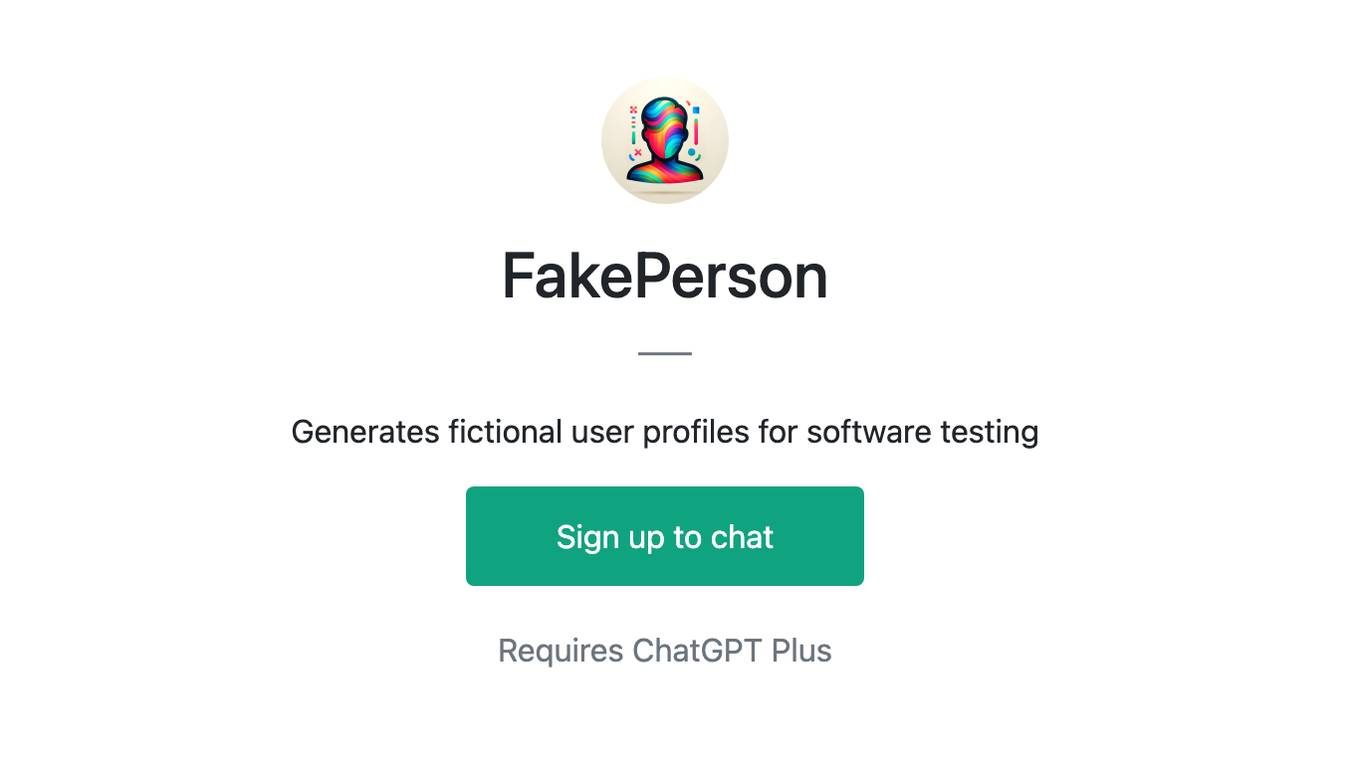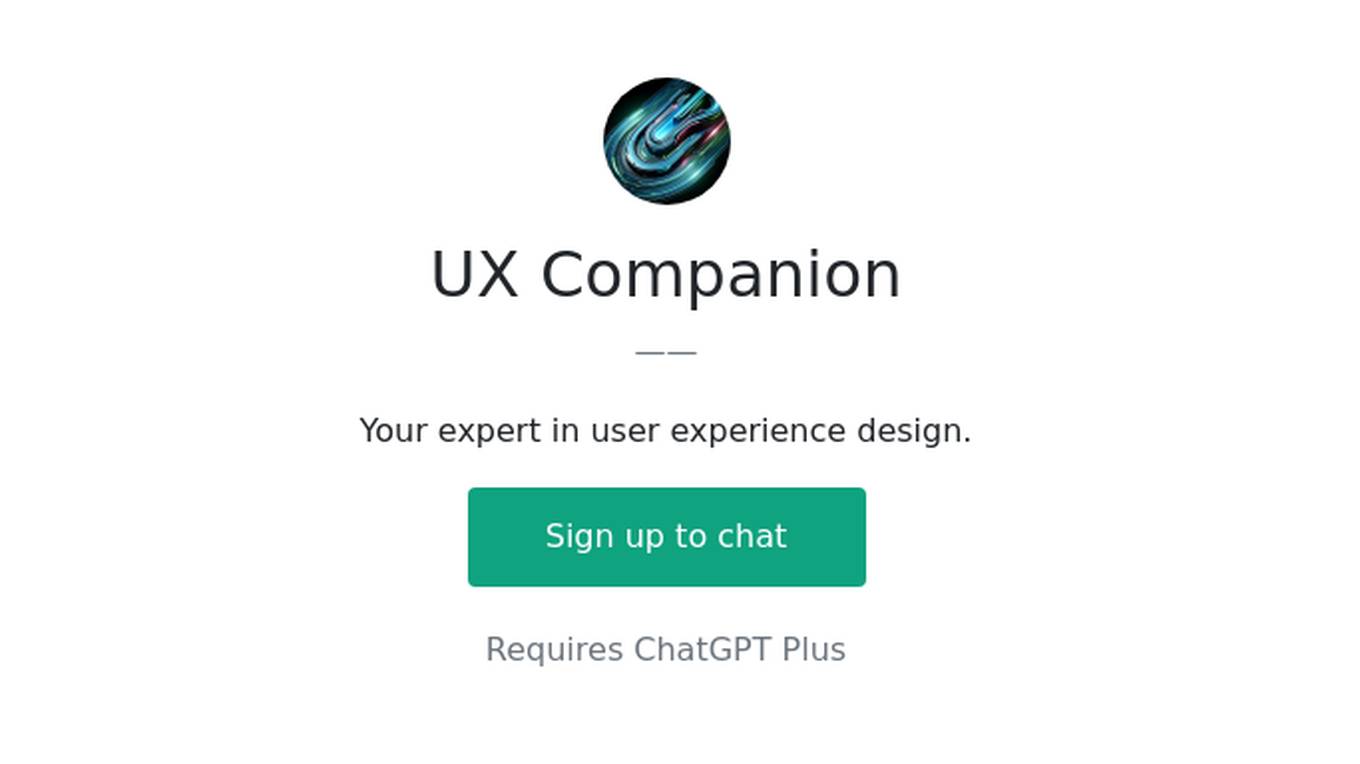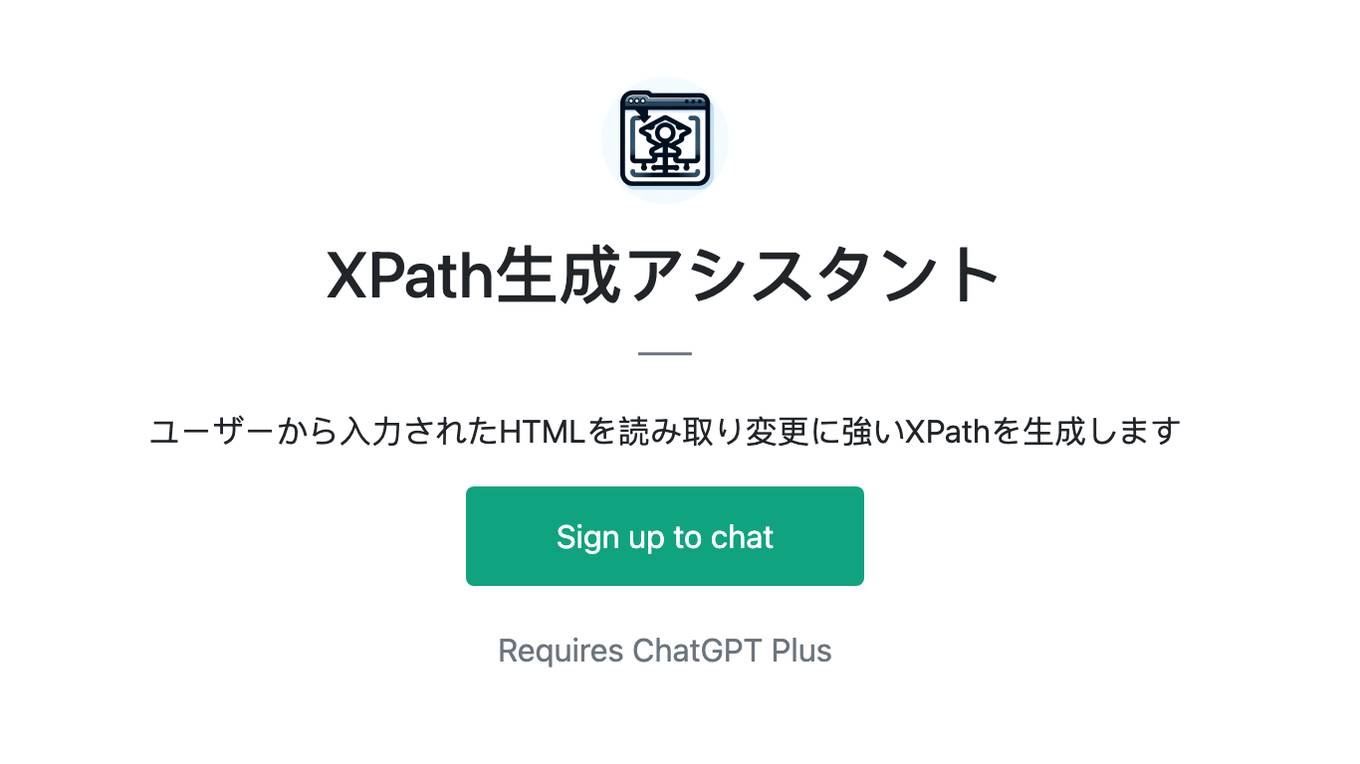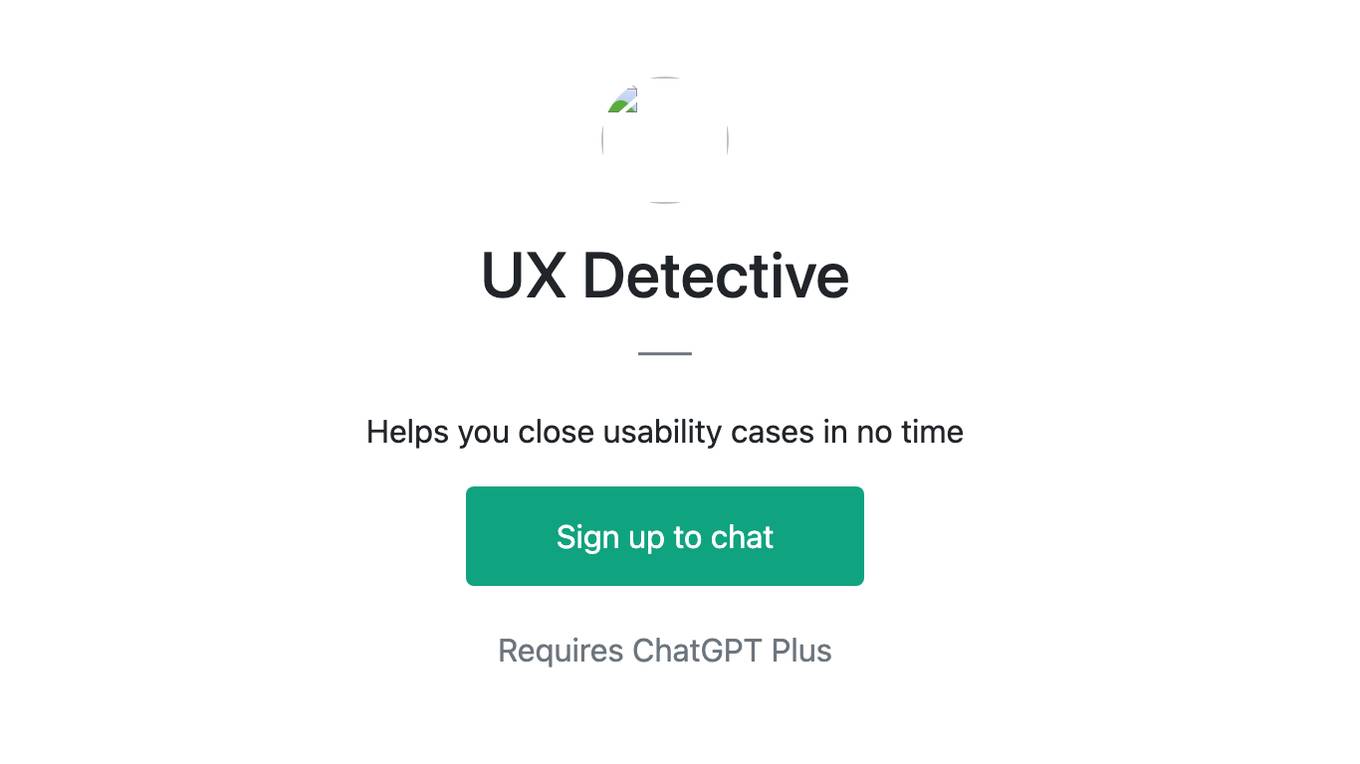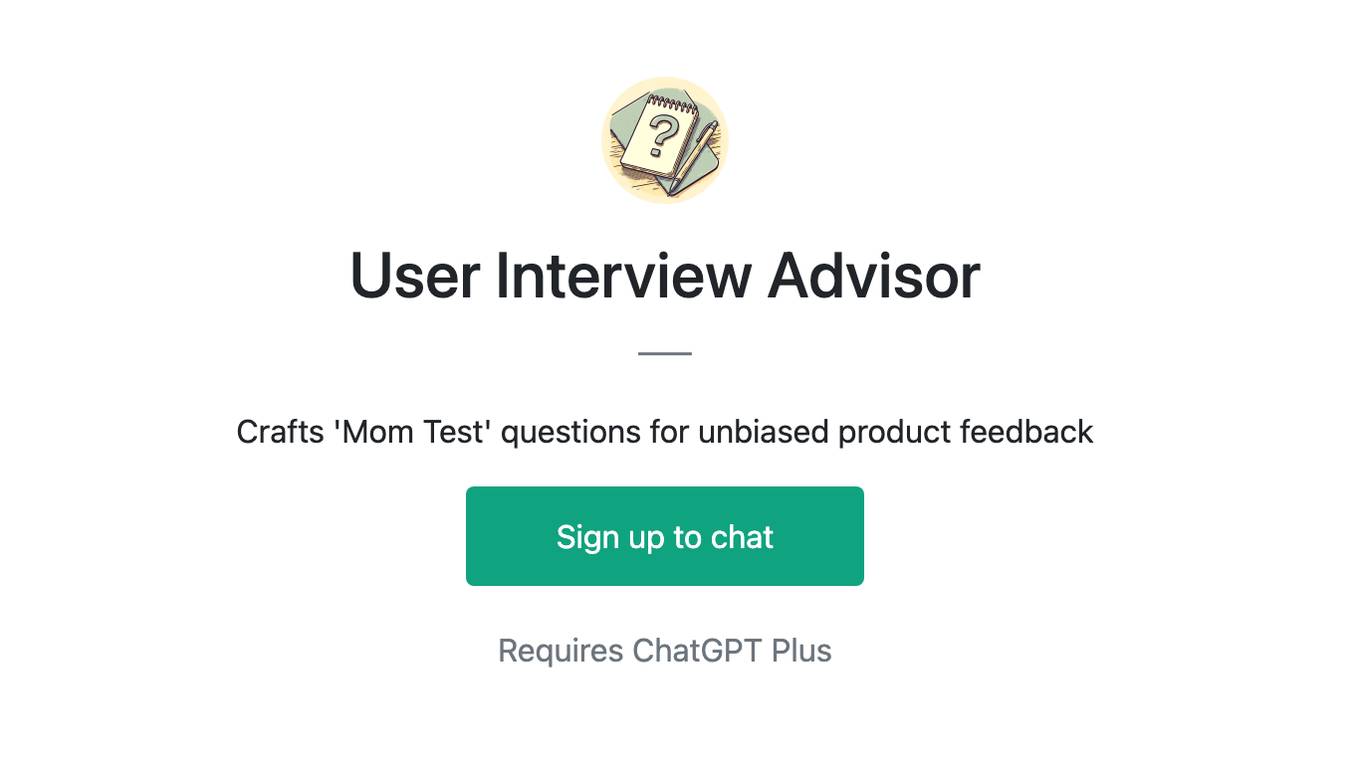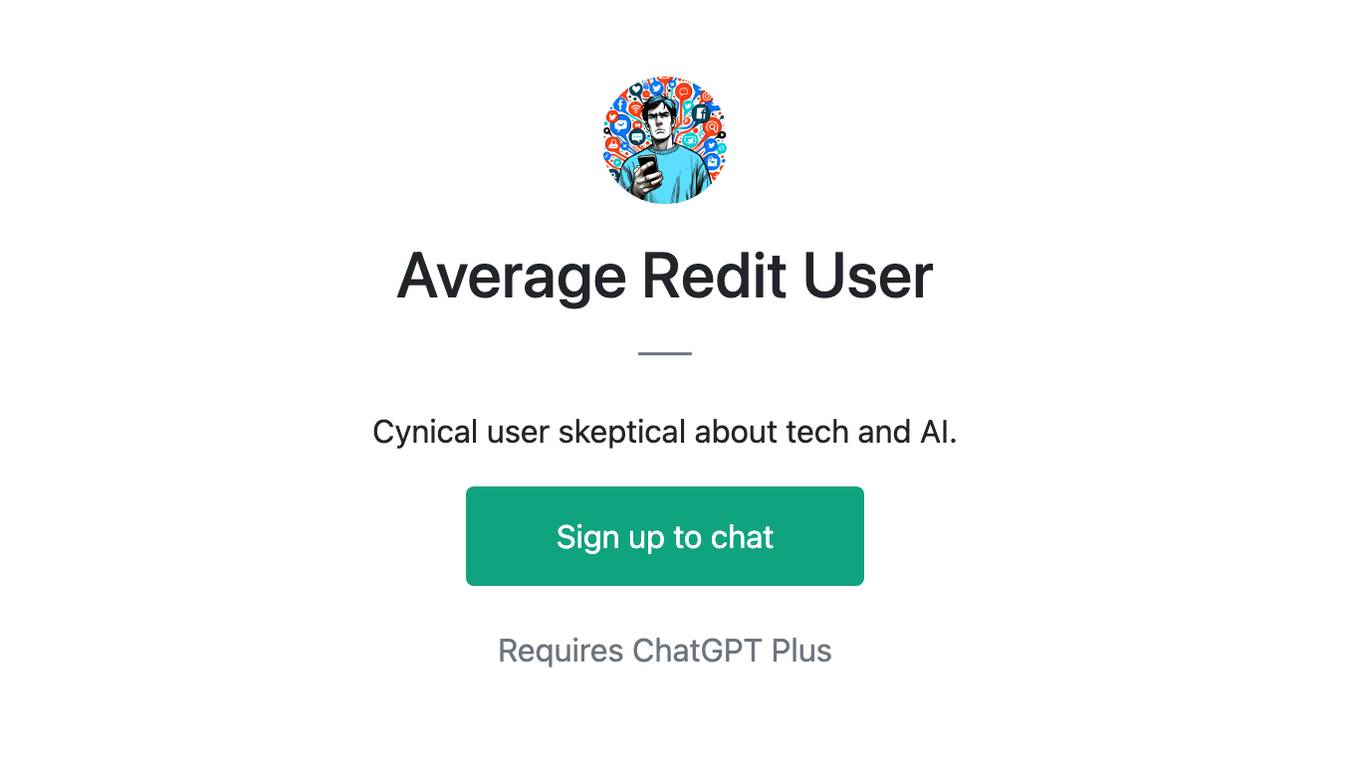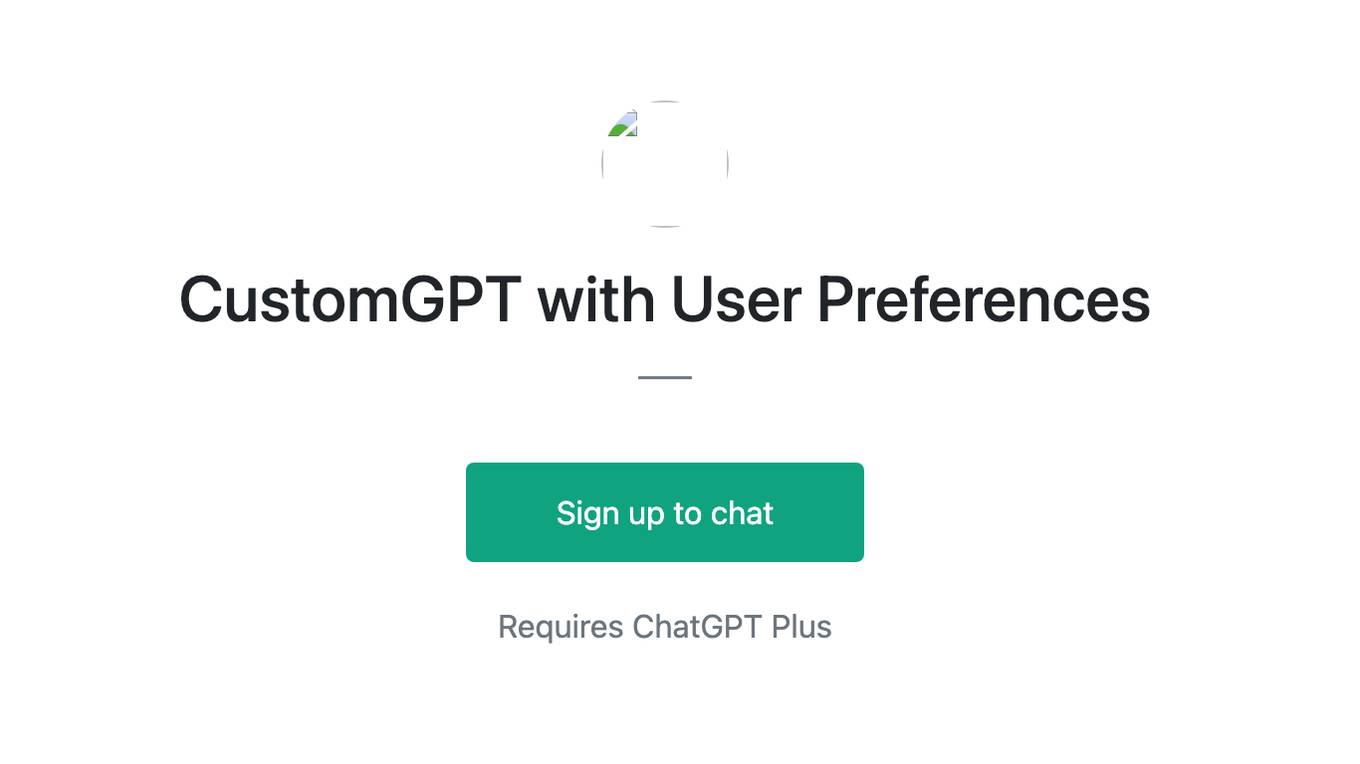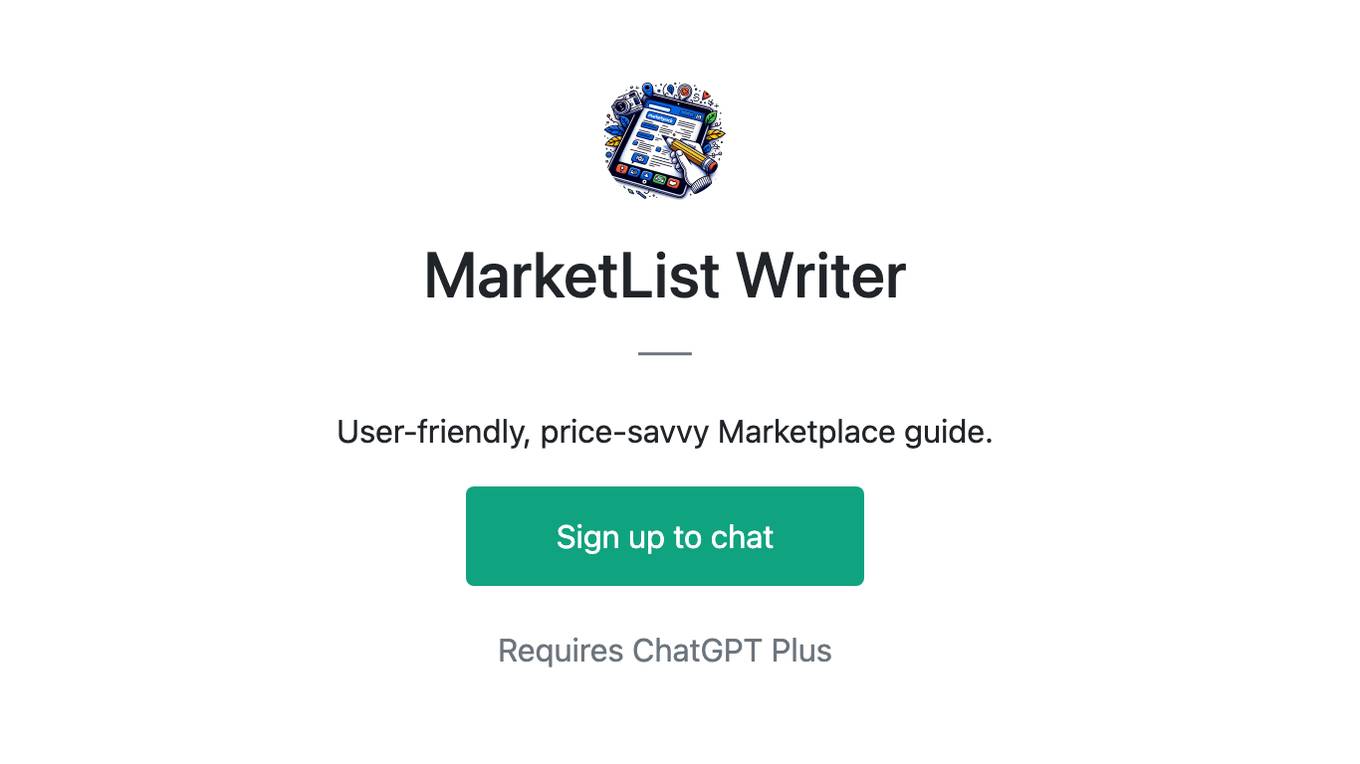Best AI tools for< user testing >
20 - AI tool Sites
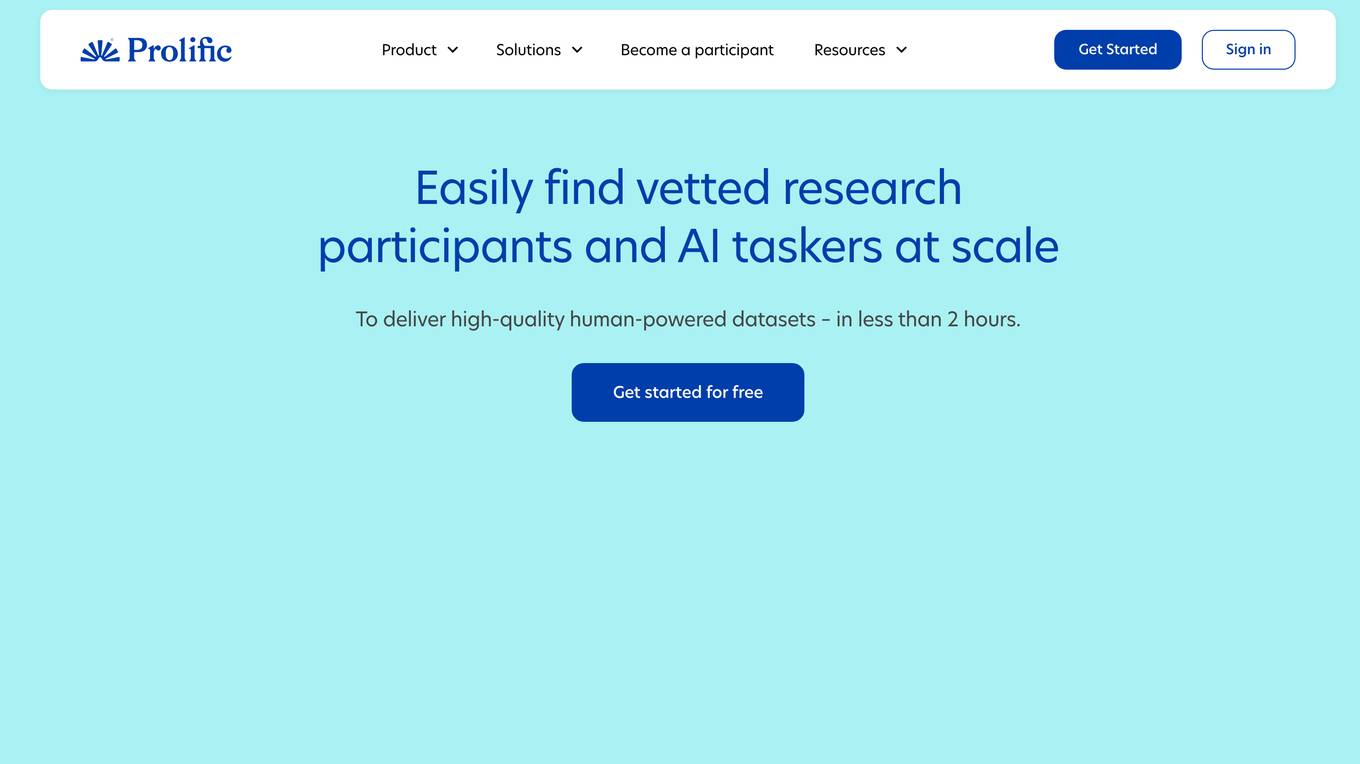
Prolific
Prolific is a platform that connects researchers with research participants and AI taskers. It provides a pool of over 120,000 active participants who are fully vetted and verified, so researchers can be sure that they are getting high-quality data. Prolific also has a number of features that make it easy for researchers to design and manage their studies, including a user-friendly interface, a variety of question types, and support for multiple languages. With Prolific, researchers can quickly and easily find the participants they need to conduct their research.
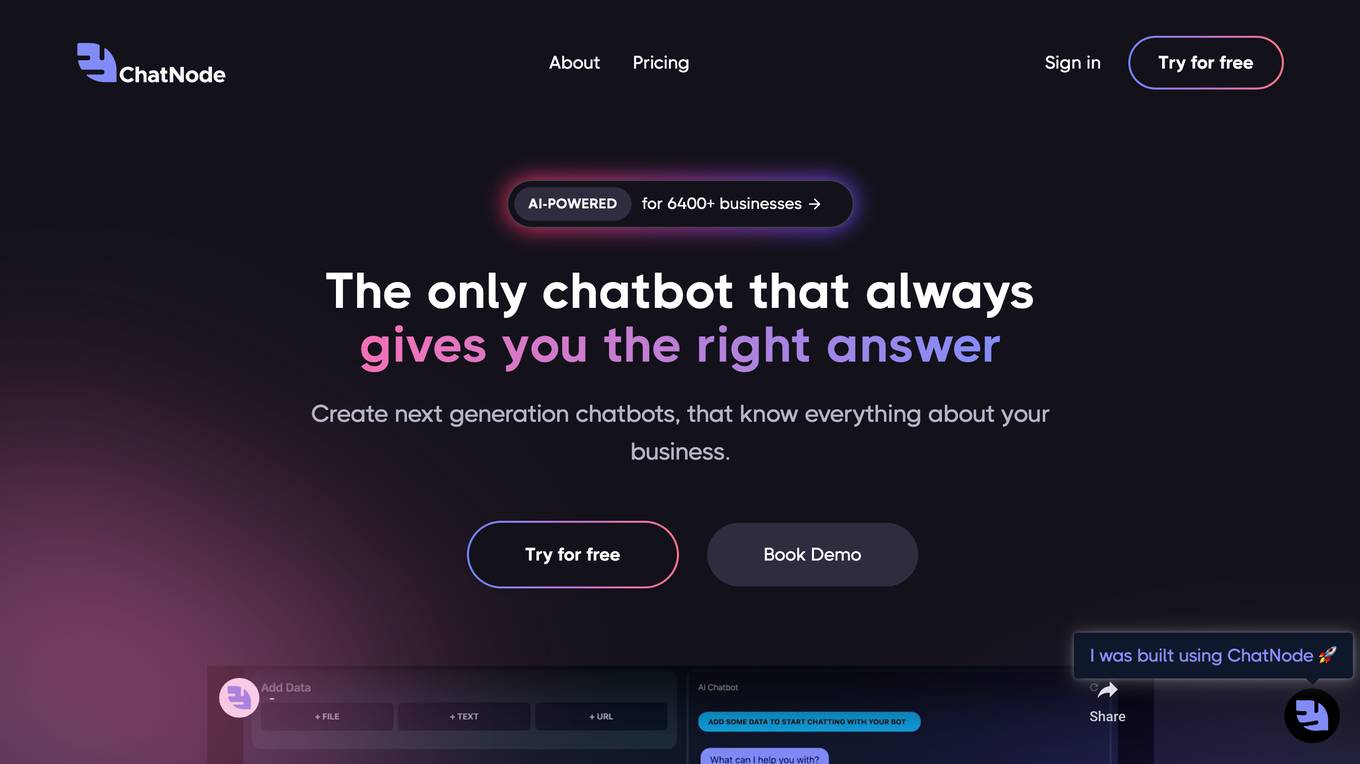
ChatNode
ChatNode is a powerful AI chatbot builder that helps businesses create next-generation chatbots that know everything about their business. With ChatNode, businesses can feed their chatbot all of their knowledge base in minutes, train the bot on any URLs or offline documents, and embed the bot anywhere on their website, in a pop-up chat, or on SLACK. ChatNode is packed with cutting-edge features, including live agent handoff, complete customization of the bots to match your brand, multiple data sources, fast and user-friendly testing and deployment, custom prompts, API access, SLACK integration, and support for 95 languages. ChatNode is also GDPR compliant and offers affordable pricing plans for startups and scale-ups.

Checksum.ai
Checksum.ai is an AI-powered end-to-end test automation tool that generates and maintains tests based on real user behavior. It helps users to test every aspect of their applications efficiently and accurately, saving time and ensuring bug-free code delivery. The tool is designed to be self-maintaining and auto-healing, adapting to changes in the application seamlessly. Checksum.ai offers comprehensive test coverage, easy integration with popular tools, and fully anonymized data collection for user privacy.
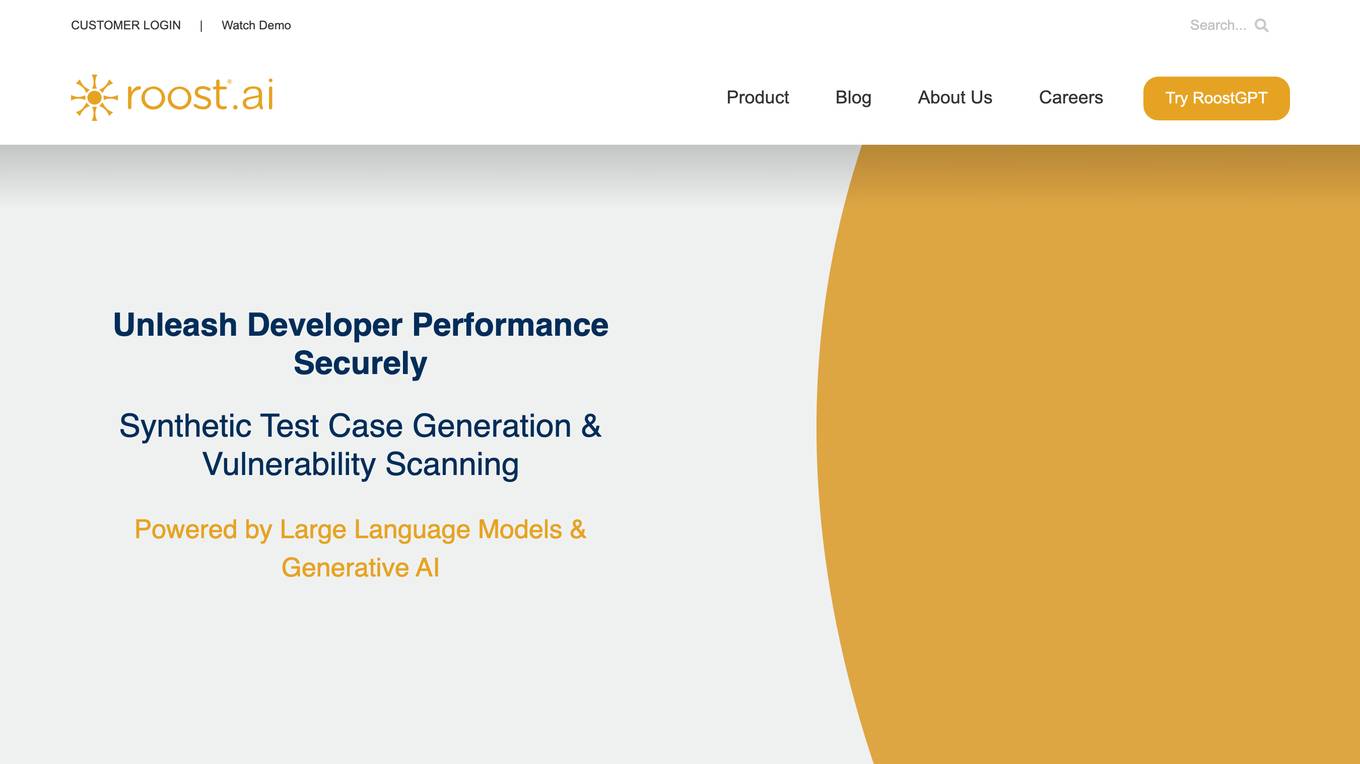
Roost.ai
Roost.ai is an AI-driven testing copilot that offers automated test case generation and code scanning services. Powered by large language models and generative AI, Roost.ai helps in building reliable software by ensuring 100% test coverage every single time. The platform automates test case generation, freeing up developer time and elevating test accuracy and coverage by identifying overlooked edge cases. Roost.ai accelerates time to market by slashing testing time and assisting in timely project releases. Customers can unlock developer potential by escaping test generation drudgery and focusing on coding and innovation.
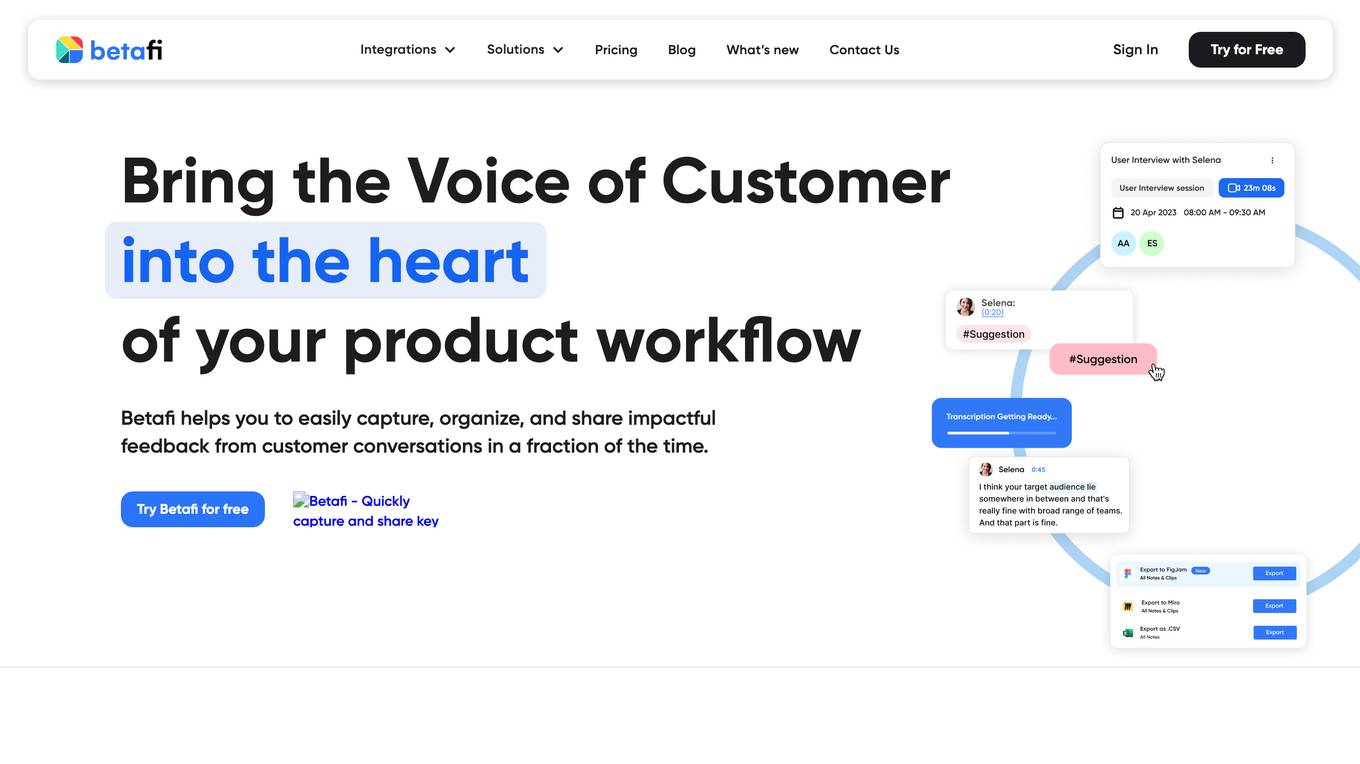
Betafi
Betafi is a cloud-based user research and product feedback platform that helps businesses capture, organize, and share customer feedback from various sources, including user interviews, usability testing, and product demos. It offers features such as timestamped note-taking, automatic transcription and translation, video clipping, and integrations with popular collaboration tools like Miro, Figma, and Notion. Betafi enables teams to gather qualitative and quantitative feedback from users, synthesize insights, and make data-driven decisions to improve their products and services.
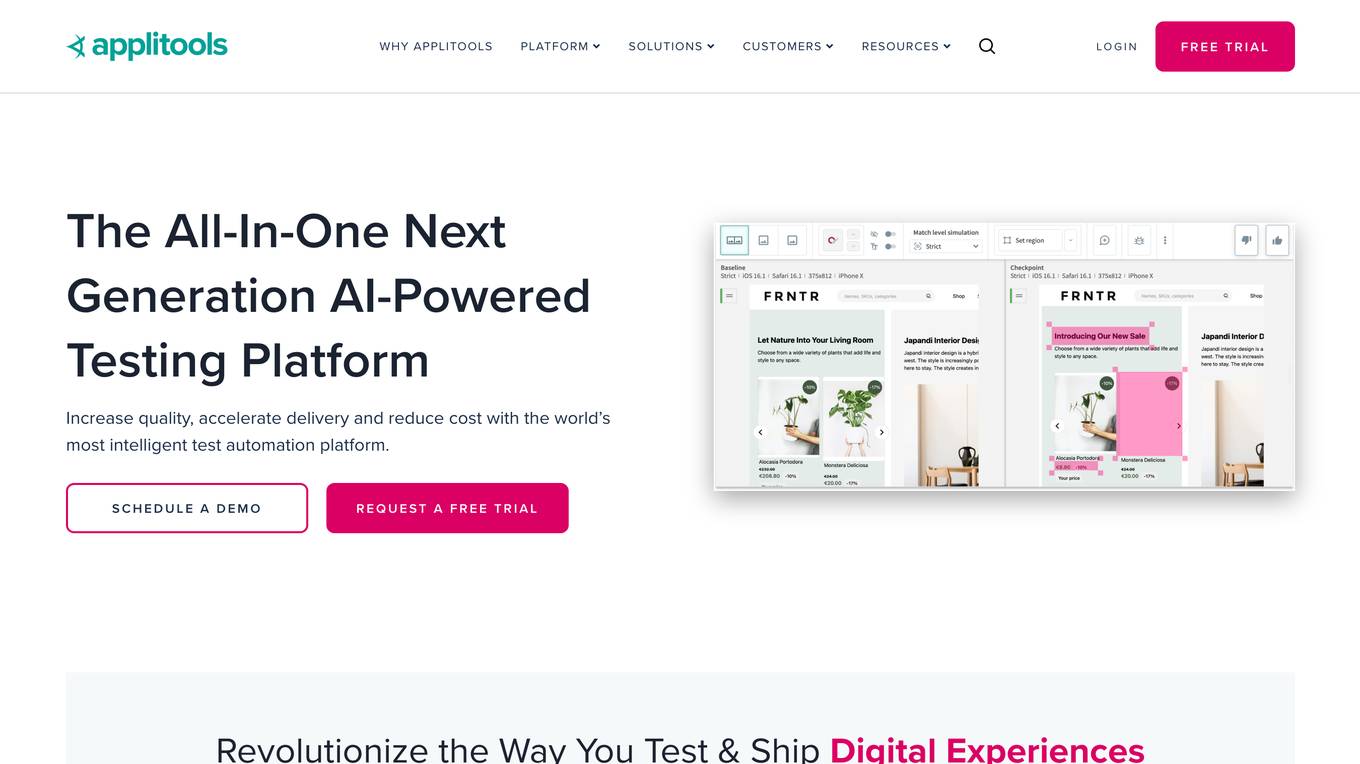
Applitools
Applitools is an AI-powered test automation platform that helps businesses improve the quality of their digital experiences. It uses visual AI to validate user interfaces across any type of screen or device, and it can be deployed on-prem, in the cloud, or as a SaaS solution. Applitools integrates with all of the major development tools and workflows, and it offers a wide range of features and advantages that can help businesses save time and money while improving the quality of their software.
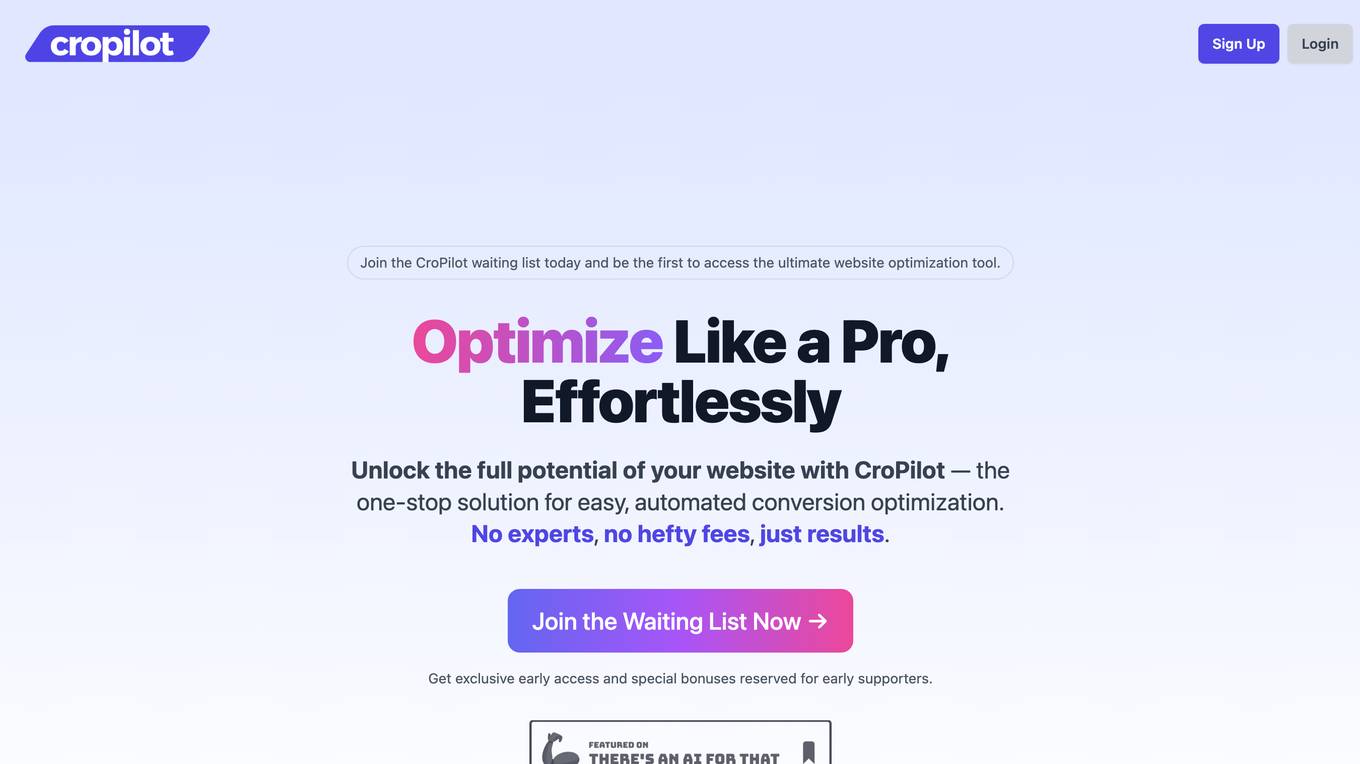
CroPilot
CroPilot is an AI-powered website optimization tool that helps businesses increase conversions and improve user experience. It offers a range of features including audience targeting, goal-oriented optimization, AI-driven insights, heatmap analysis, automated analytics reporting, and A/B testing. CroPilot is easy to use and integrates seamlessly with popular platforms like WordPress, WooCommerce, and Shopify. It is suitable for businesses of all sizes and can complement existing optimization tools.
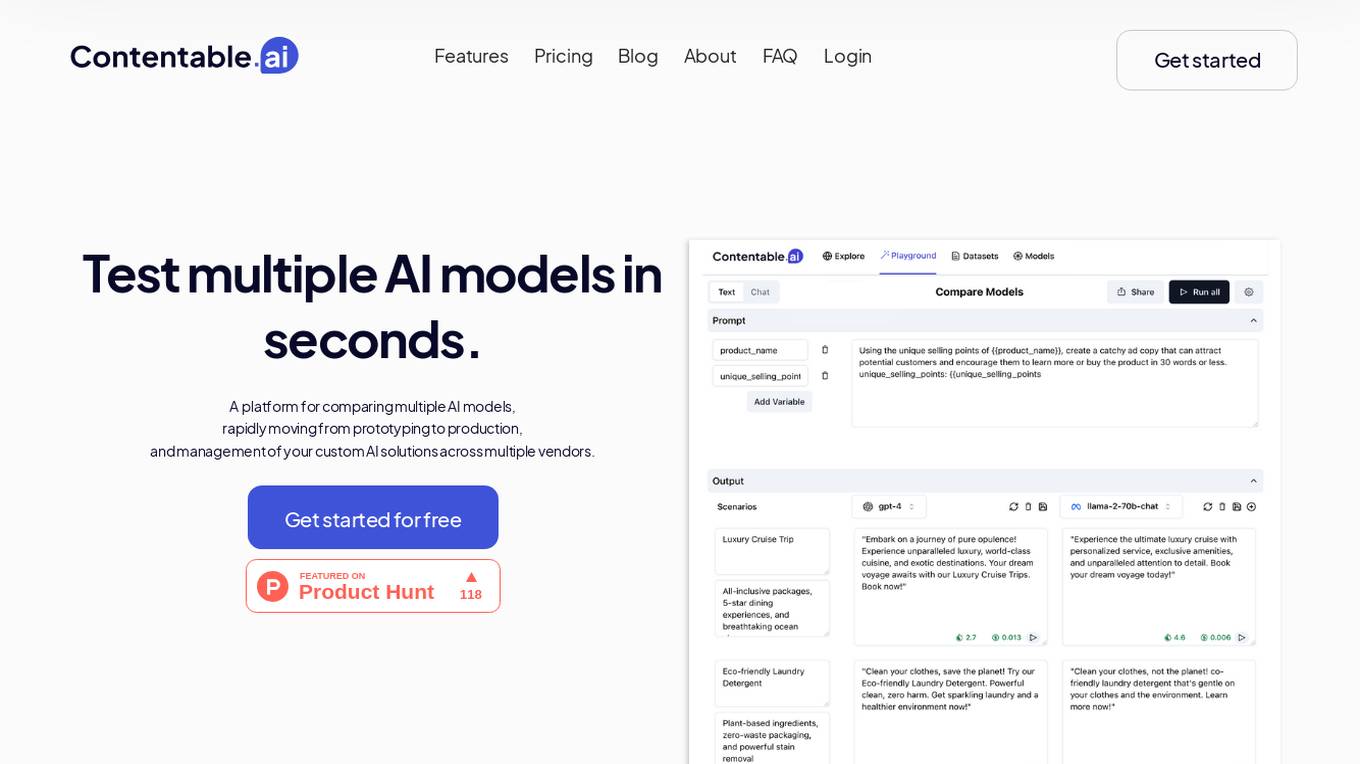
Contentable.ai
Contentable.ai is a platform for comparing multiple AI models, rapidly moving from prototyping to production, and management of your custom AI solutions across multiple vendors. It allows users to test multiple AI models in seconds, compare models side-by-side across top AI providers, collaborate on AI models with their team seamlessly, design complex AI workflows without coding, and pay as they go.
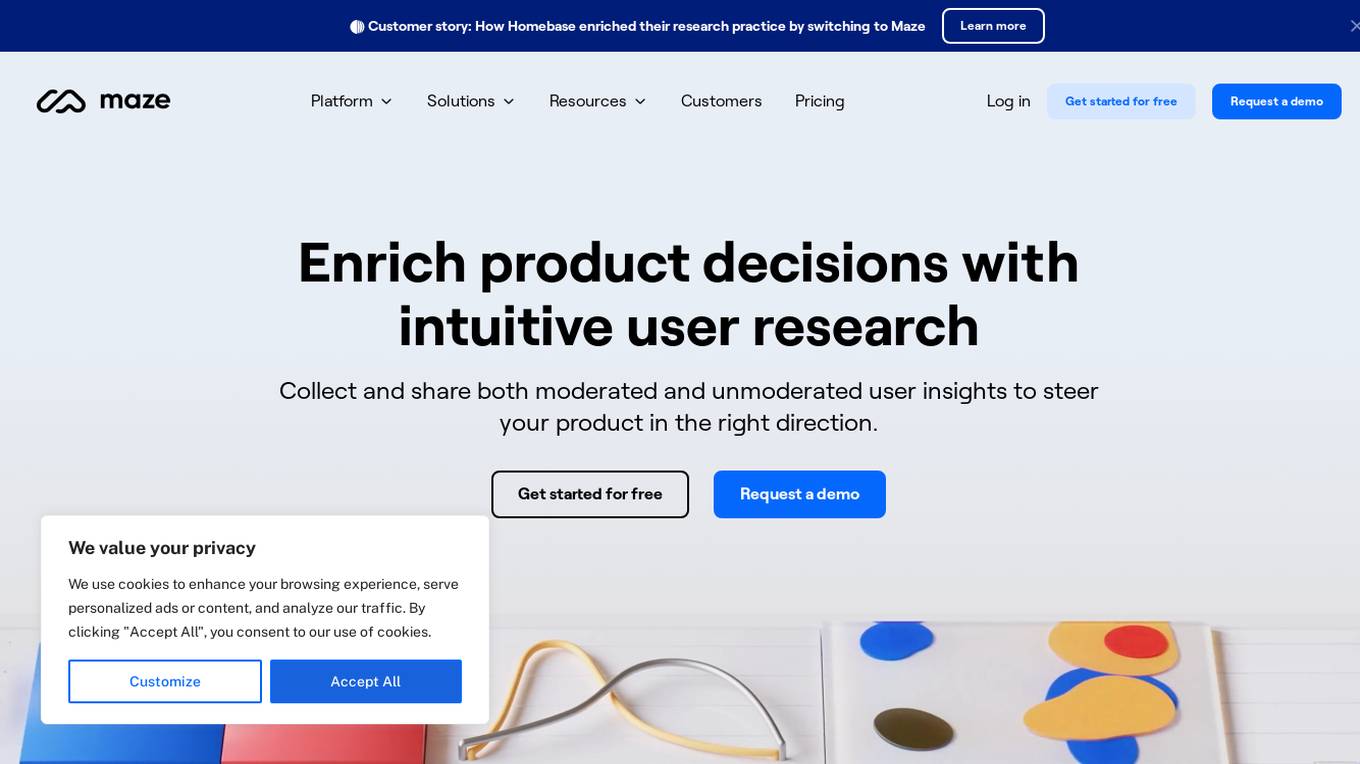
Maze
Maze is a continuous product discovery platform that enables users to enrich product decisions with intuitive user research. It offers a wide range of features such as prototype testing, website testing, surveys, interview studies, and more. With AI-powered tools and integrations with popular design tools, Maze helps users scale user insights and speed up product launches. The platform provides Enterprise-level protection, encrypted transmission, access control, data center security, GDPR compliance, SSO, and private workspaces to ensure data security and compliance. Trusted by companies of all industries and sizes, Maze empowers teams to make user-informed decisions and drive faster product iteration for a better user experience.
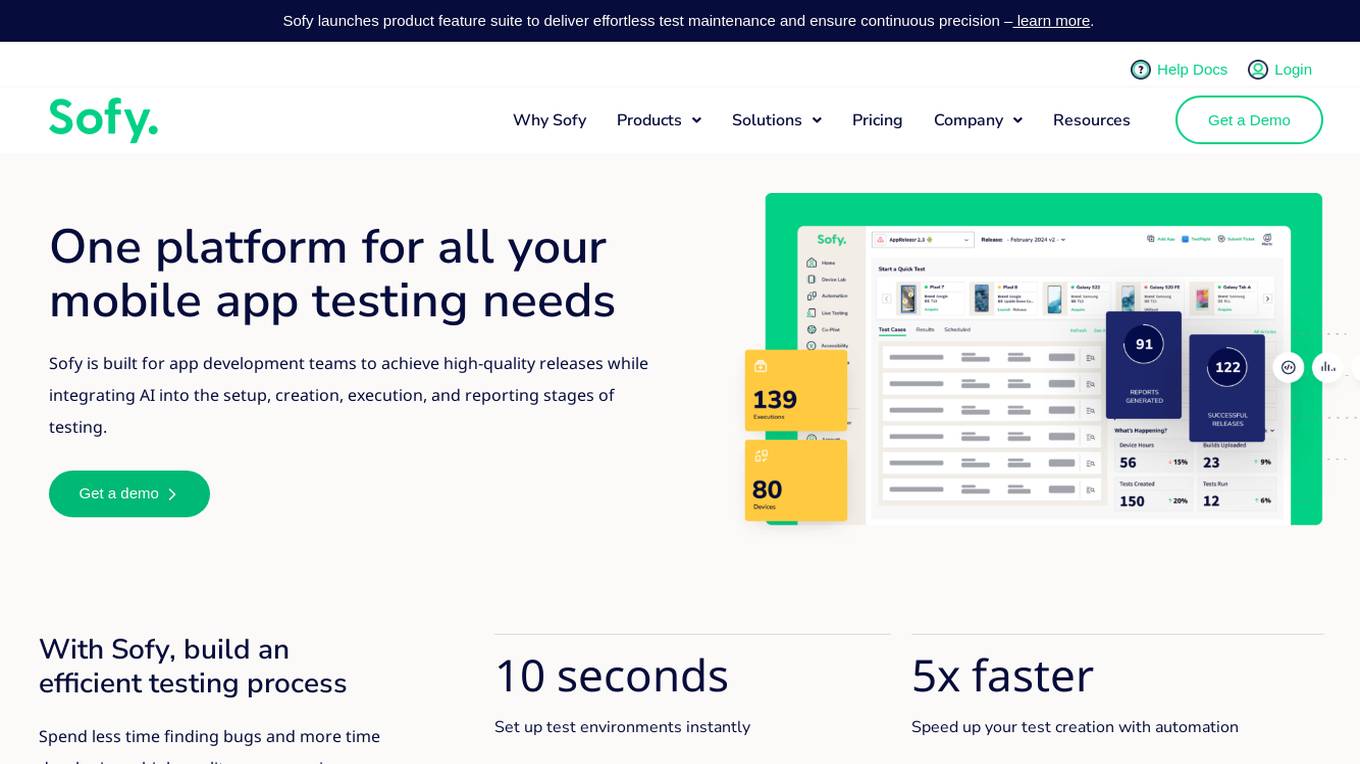
Sofy
Sofy is a revolutionary no-code testing platform for mobile applications that integrates AI to streamline the testing process. It offers features such as manual and ad-hoc testing, no-code automation, AI-powered test case generation, and real device testing. Sofy helps app development teams achieve high-quality releases by simplifying test maintenance and ensuring continuous precision. With a focus on efficiency and user experience, Sofy is trusted by top industries for its all-in-one testing solution.
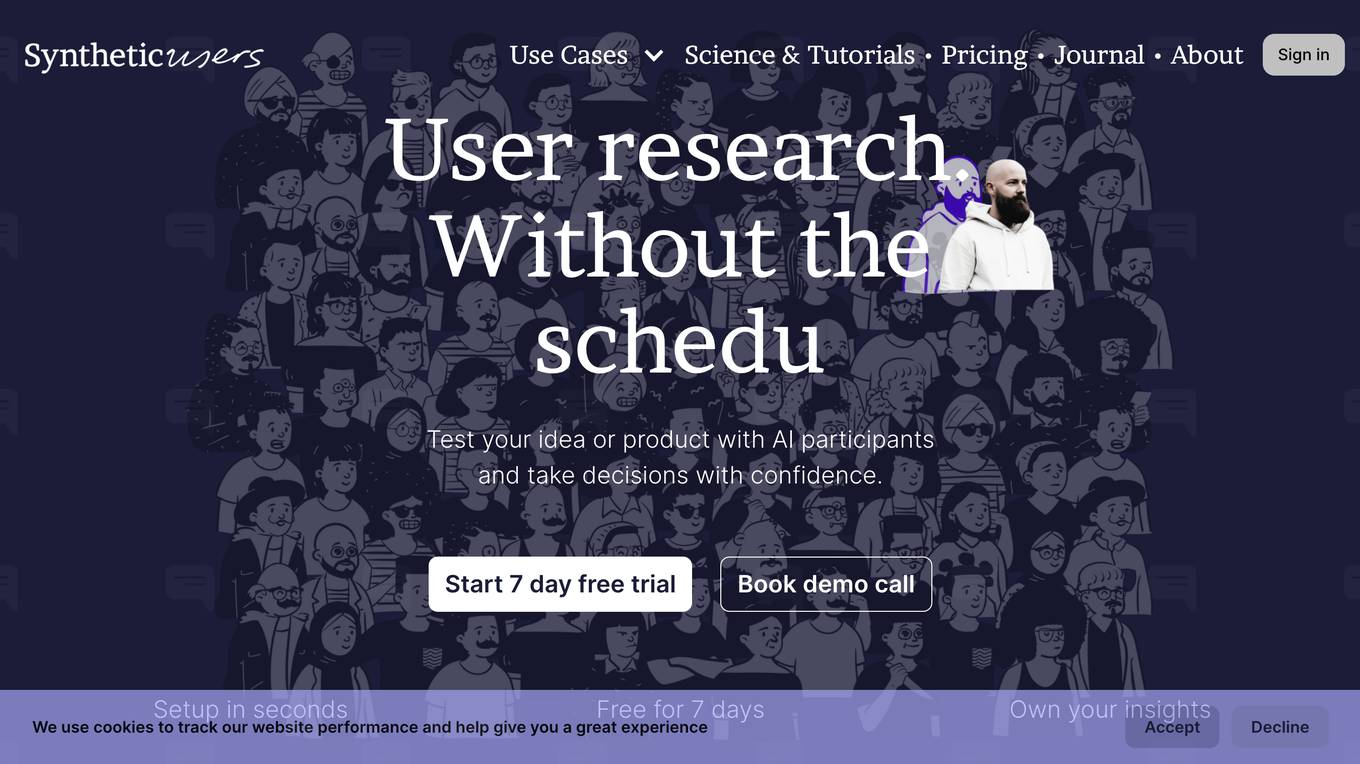
Synthetic Users
Synthetic Users is an AI-powered user research tool that allows users to conduct user research without the traditional challenges and headaches. The platform leverages advanced AI architecture to create accurate synthetic interviews and surveys, enabling users to gain valuable insights for various applications. Synthetic Users uses the power of Large Language Models (LLMs) to generate human-like AI participants with high Synthetic Organic Parity, ensuring relevant and reflective data. The tool offers a multi-agent architecture for dynamic interactions, continuous learning, and adaptation, mimicking real human behaviors. Users can run problem exploration interviews, concept testing interviews, and enrich their own Synthetic Users with proprietary data. With a focus on enhancing user satisfaction and identifying market needs, Synthetic Users provides a complete suite of research solutions for product discovery, marketing, and growth.
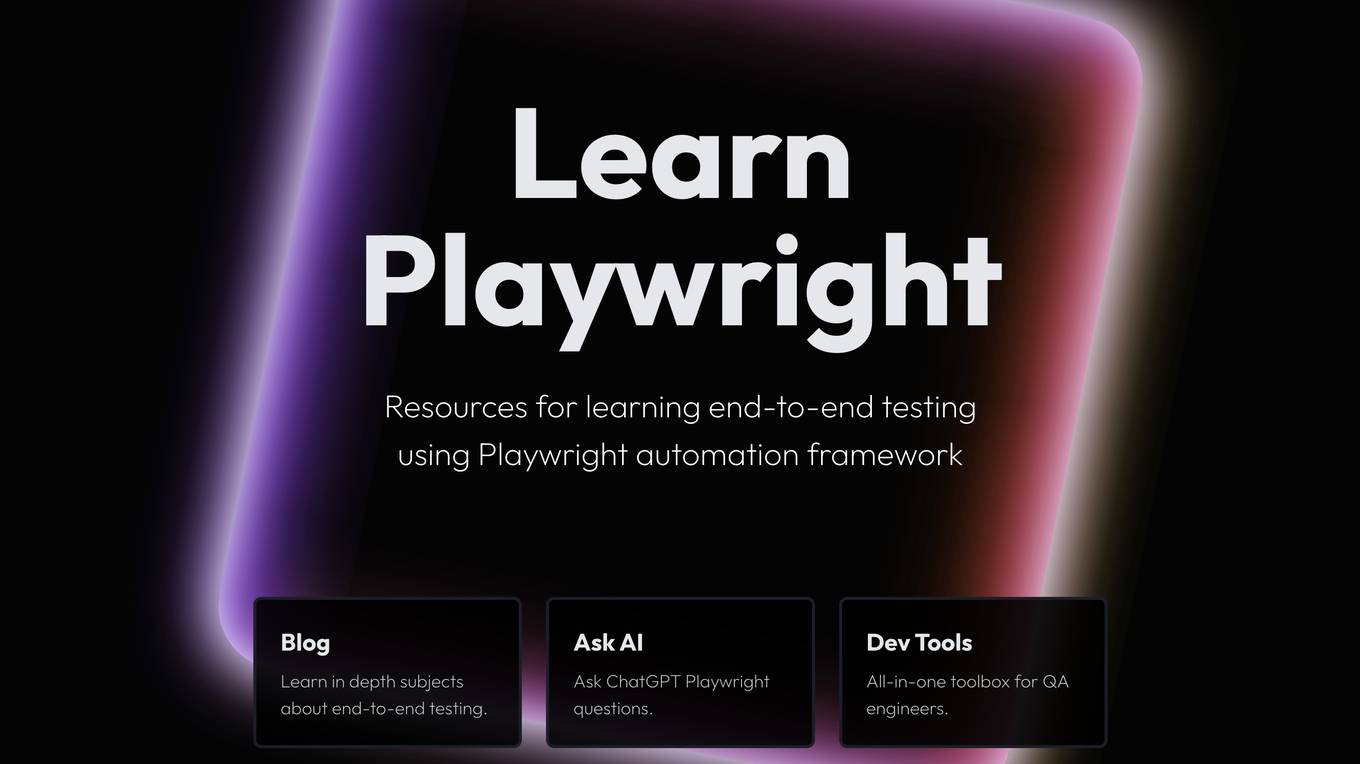
Learn Playwright
Learn Playwright is a comprehensive platform providing resources for learning end-to-end testing using the Playwright automation framework. It offers a blog with in-depth subjects about end-to-end testing, an 'Ask AI' feature for querying ChatGPT about Playwright, and a Dev Tools section that serves as an all-in-one toolbox for QA engineers. Additionally, users can explore QA job opportunities, access answered questions about Playwright, browse a Discord forum archive, watch tutorials and conference talks, utilize a browser extension for generating Playwright locators, and refer to a QA Wiki for definitions of common testing terms. With a user-friendly interface and valuable content, Learn Playwright aims to enhance the testing experience for professionals and enthusiasts alike.
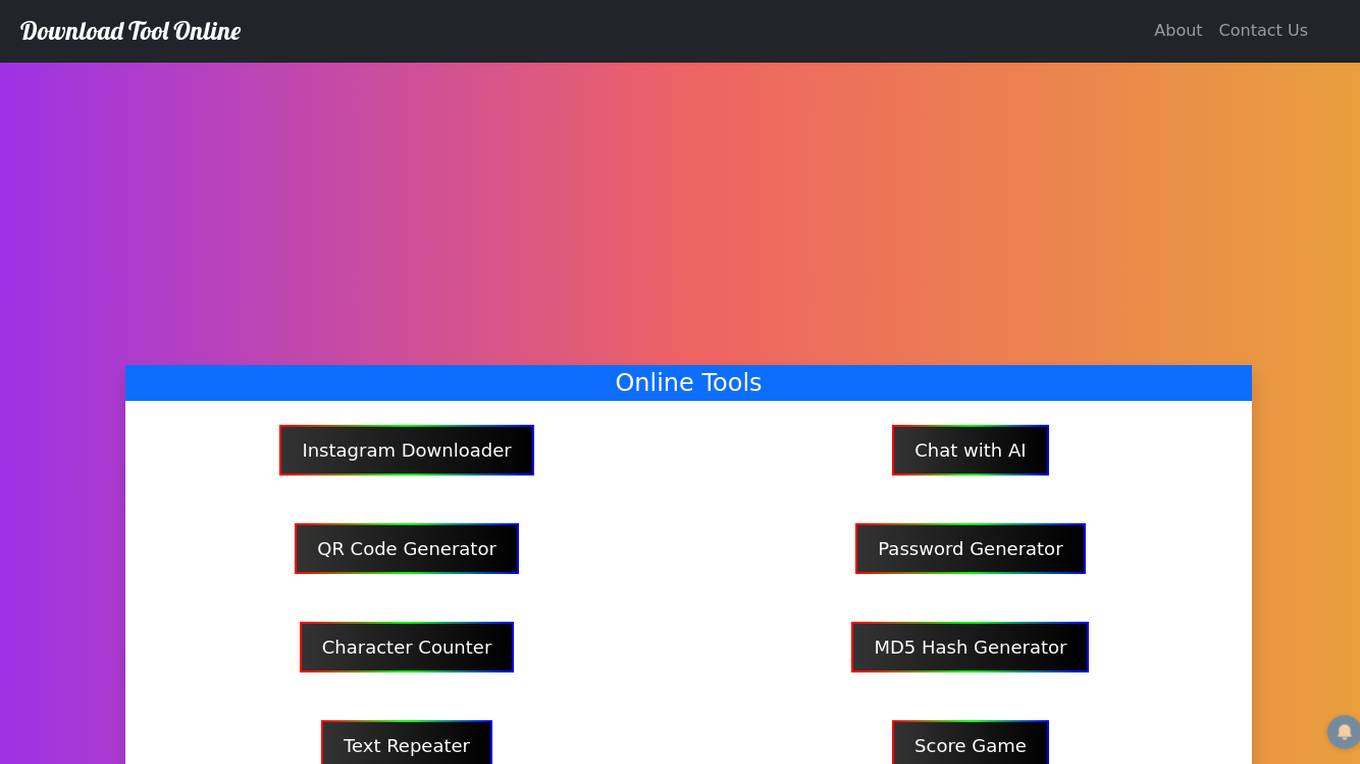
Online Tools
This website provides a suite of online tools to enhance productivity, security, and user experience in the digital space. These tools include: 1. Instagram Downloader: Easily download Instagram Reels, Stories, and posts by pasting the link. 2. Text Repeater: Repeat text multiple times for testing, SEO, or software development. 3. Character Counter: Analyze text content by providing character, word, sentence, and paragraph counts. 4. QR Code Generator: Generate QR codes from text for websites, Wi-Fi, emails, and more. 5. Password Generator: Create strong and complex passwords to enhance online security. 6. MD5 Hash Generator: Encrypt text into a 128-bit fingerprint for enhanced security and data integrity. 7. Chat with AI: Converse with a virtual assistant for basic queries and customer service.
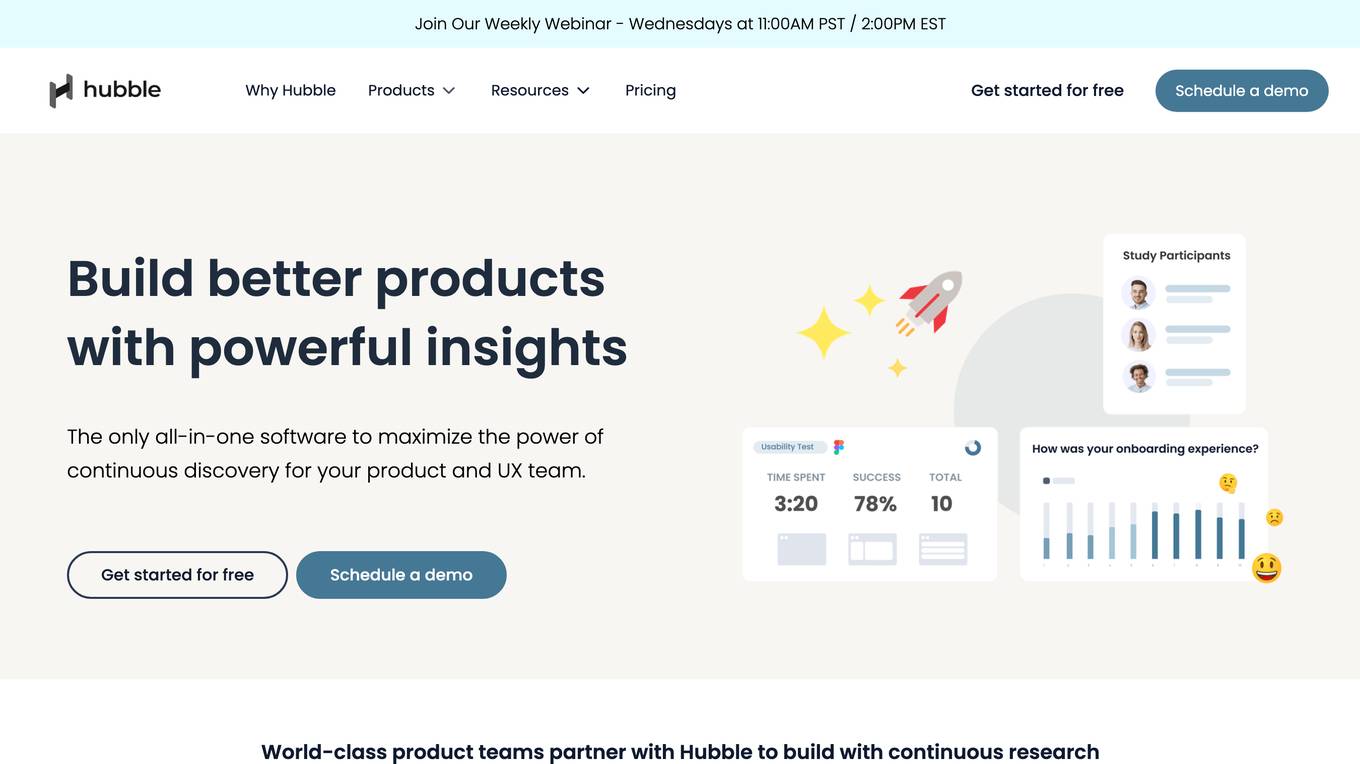
Hubble
Hubble is an all-in-one user research software that offers a comprehensive suite of tools for continuous discovery. It provides features such as in-product research, contextual surveys, prototype tests, usability tests, participant recruitment, user targeting, and more. Hubble aims to empower product teams with valuable insights to enhance user experience and product decisions.
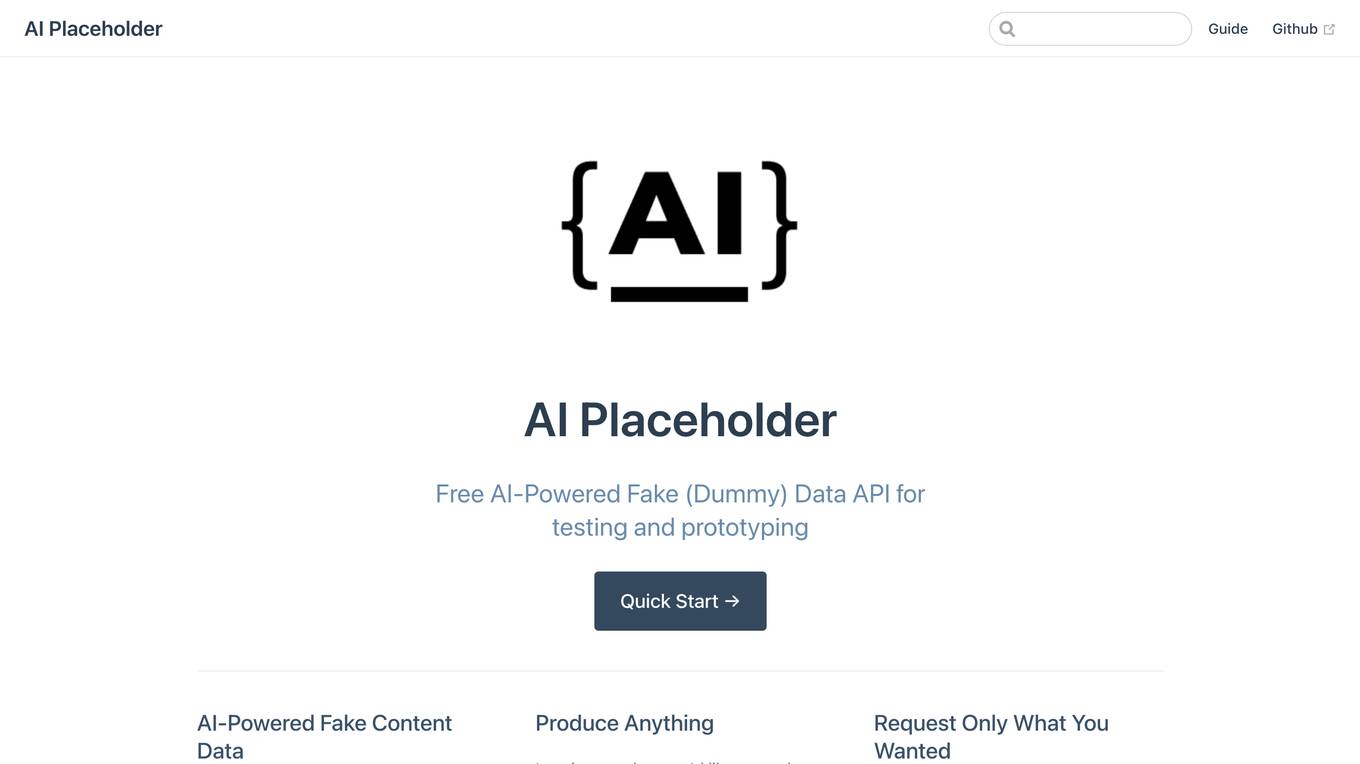
AI Placeholder
AI Placeholder is a free AI-Powered Fake or Dummy Data API for testing and prototyping. It leverages OpenAI's GPT-3.5-Turbo Model API to generate fake content. Users can directly use the hosted version or self-host it. The API allows users to generate various types of data with specified rules, such as forum users, CRM sales deals, products from a marketplace, tweets, and more. It provides flexibility in retrieving data and is suitable for testing and prototyping purposes.
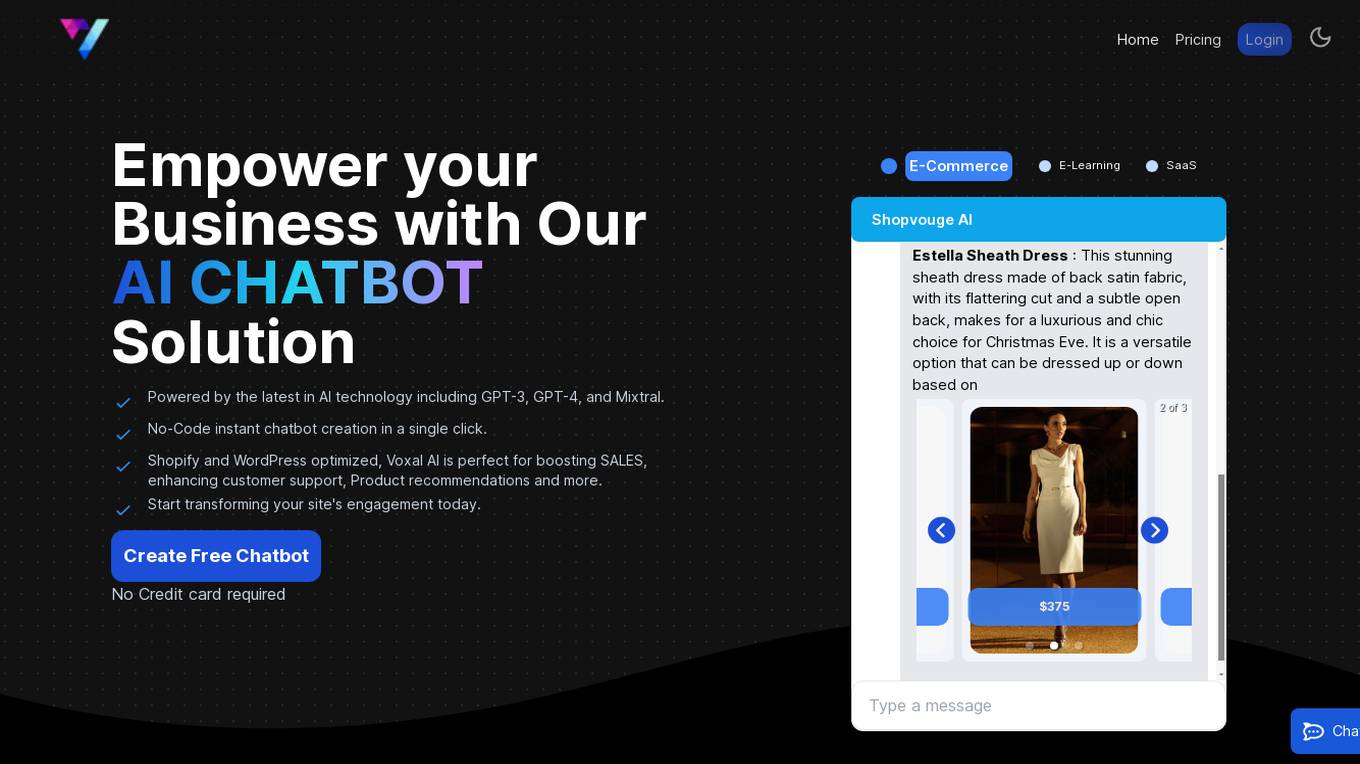
Voxal AI
Voxal AI is an AI-powered chatbot solution designed to enhance sales, customer support, and user engagement on websites. It offers a range of features including multiple AI models, A/B testing, cross-platform compatibility, multilingual support, advanced analytics, customization options, and multi-platform integration. Voxal AI is suitable for various industries such as e-commerce, e-learning, and SaaS, and can be used for tasks such as product recommendations, lead qualification, and automated customer support.

OpenBuckets
OpenBuckets is a web application designed to help users find and secure open buckets in cloud storage systems. It provides a user-friendly interface for scanning and identifying publicly accessible buckets, allowing users to take necessary actions to secure their data. With OpenBuckets, users can easily detect potential security risks and protect their sensitive information stored in cloud storage. The application is a valuable tool for individuals and organizations looking to enhance their data security measures in the cloud.
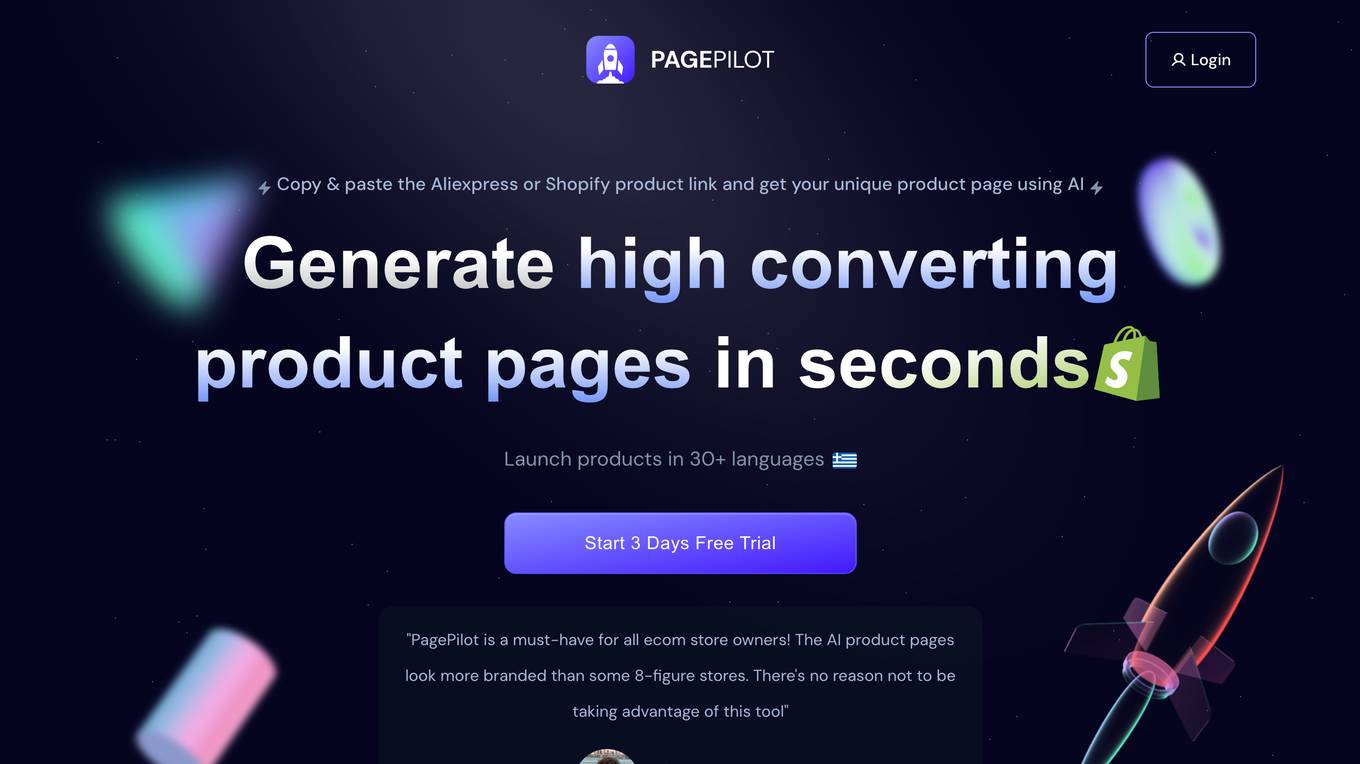
Page Pilot AI
Page Pilot AI is a tool that helps e-commerce store owners create high-converting product pages and ad copy using artificial intelligence. It offers features such as product page generation, ad creative generation, and access to winning products. With Page Pilot AI, users can save time and money by automating the product testing phase and launching products faster.
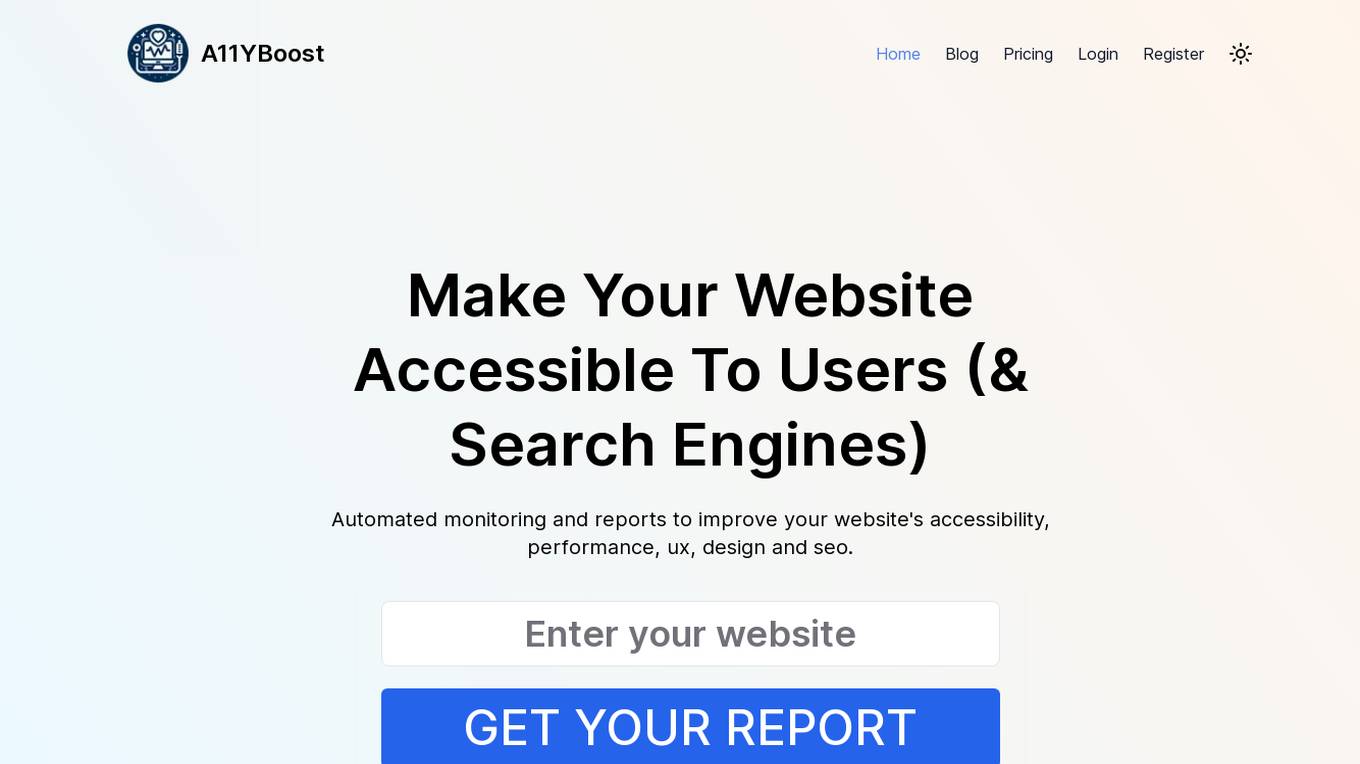
A11YBoost
A11YBoost is an automated website accessibility monitoring and reporting tool that helps businesses improve the accessibility, performance, UX, design, and SEO of their websites. It provides instant and detailed accessibility reports that cover key issues, their impact, and how to fix them. The tool also offers analytics history to track progress over time and covers not just core accessibility issues but also performance, UX, design, and SEO. A11YBoost uses a unique blend of AI testing, traditional testing, and human expertise to deliver results and has an expanding test suite with 25+ tests across five categories.
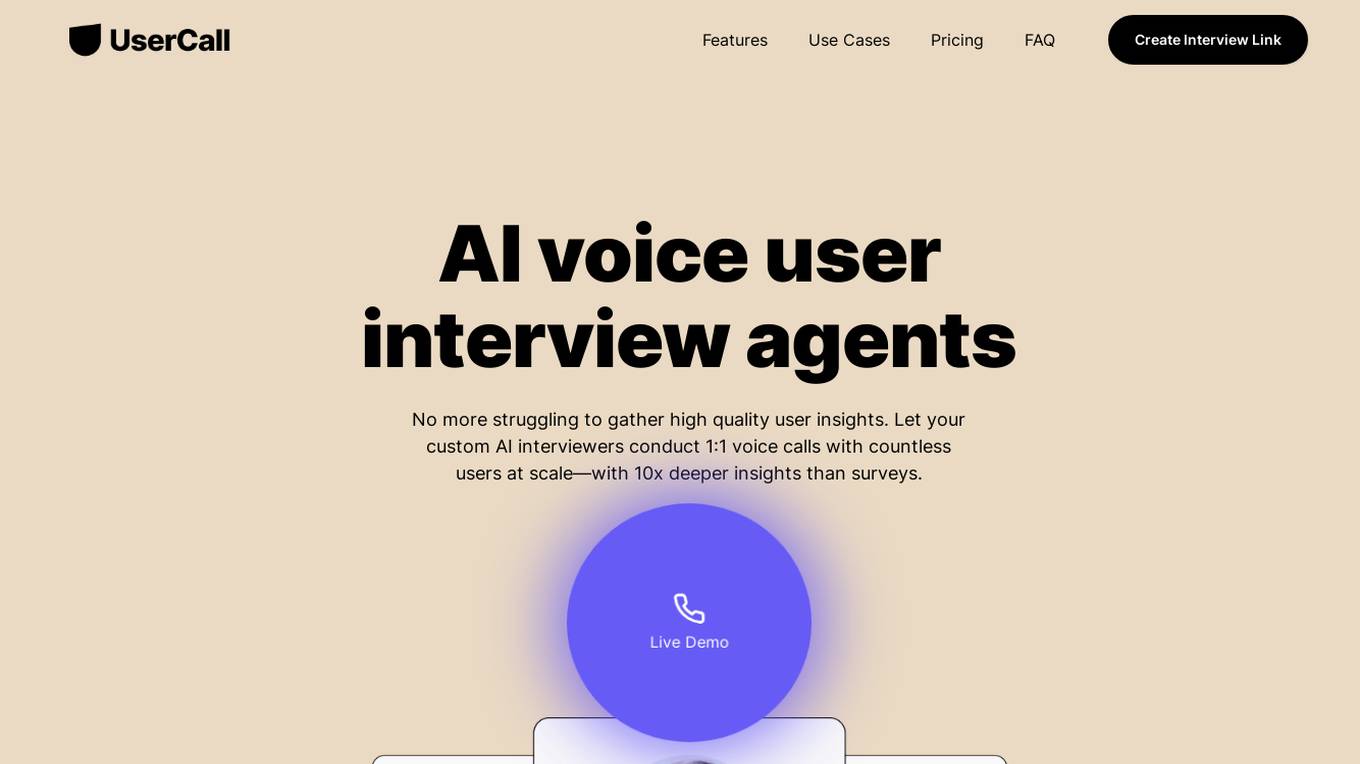
UserCall
UserCall is an AI-powered platform that enables users to conduct high-quality user interviews using custom AI interviewers. The platform offers deep insights through 1:1 voice calls with users, providing smart follow-up questions to uncover customer needs. UserCall saves time and effort by extracting key actionable insights from conversations, offering branded interview links, and facilitating continuous feedback, market research, participant screening, usability testing, and customer satisfaction analysis.
20 - Open Source AI Tools
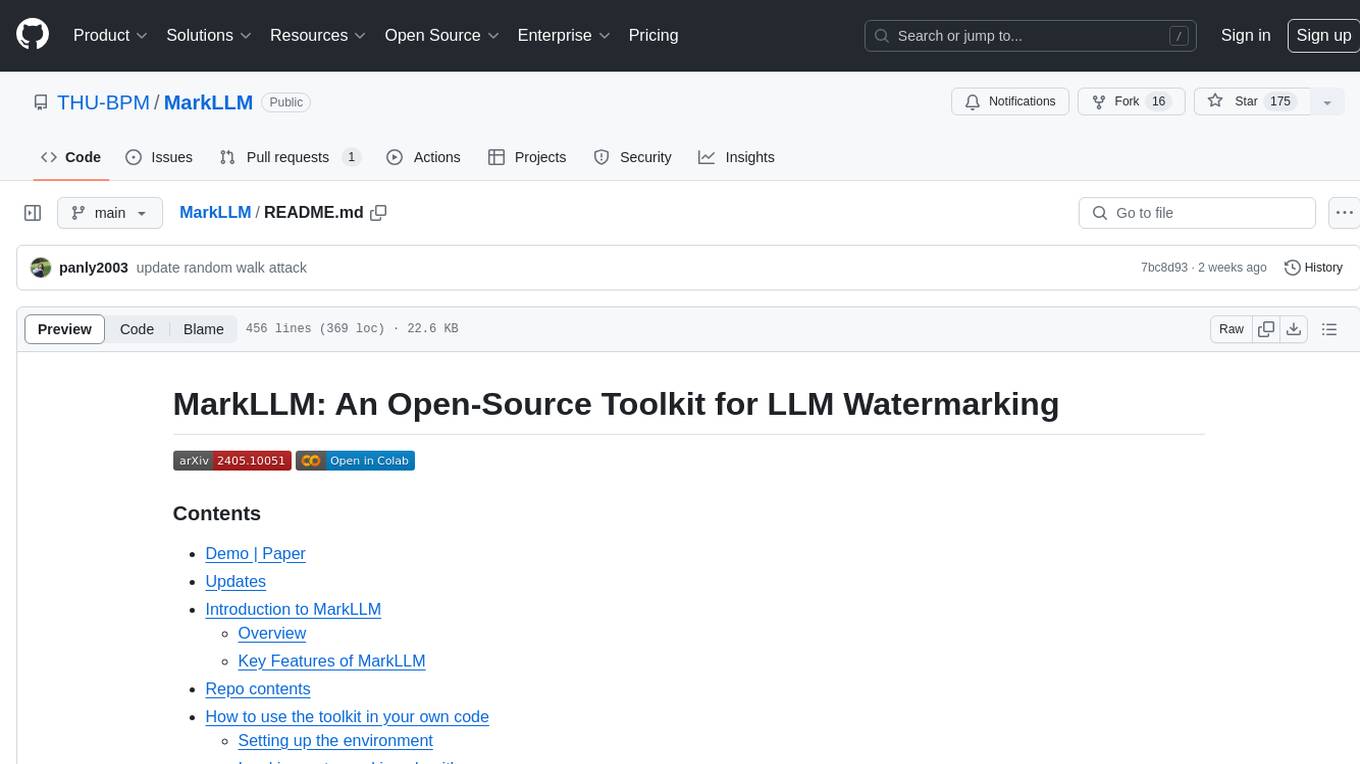
MarkLLM
MarkLLM is an open-source toolkit designed for watermarking technologies within large language models (LLMs). It simplifies access, understanding, and assessment of watermarking technologies, supporting various algorithms, visualization tools, and evaluation modules. The toolkit aids researchers and the community in ensuring the authenticity and origin of machine-generated text.
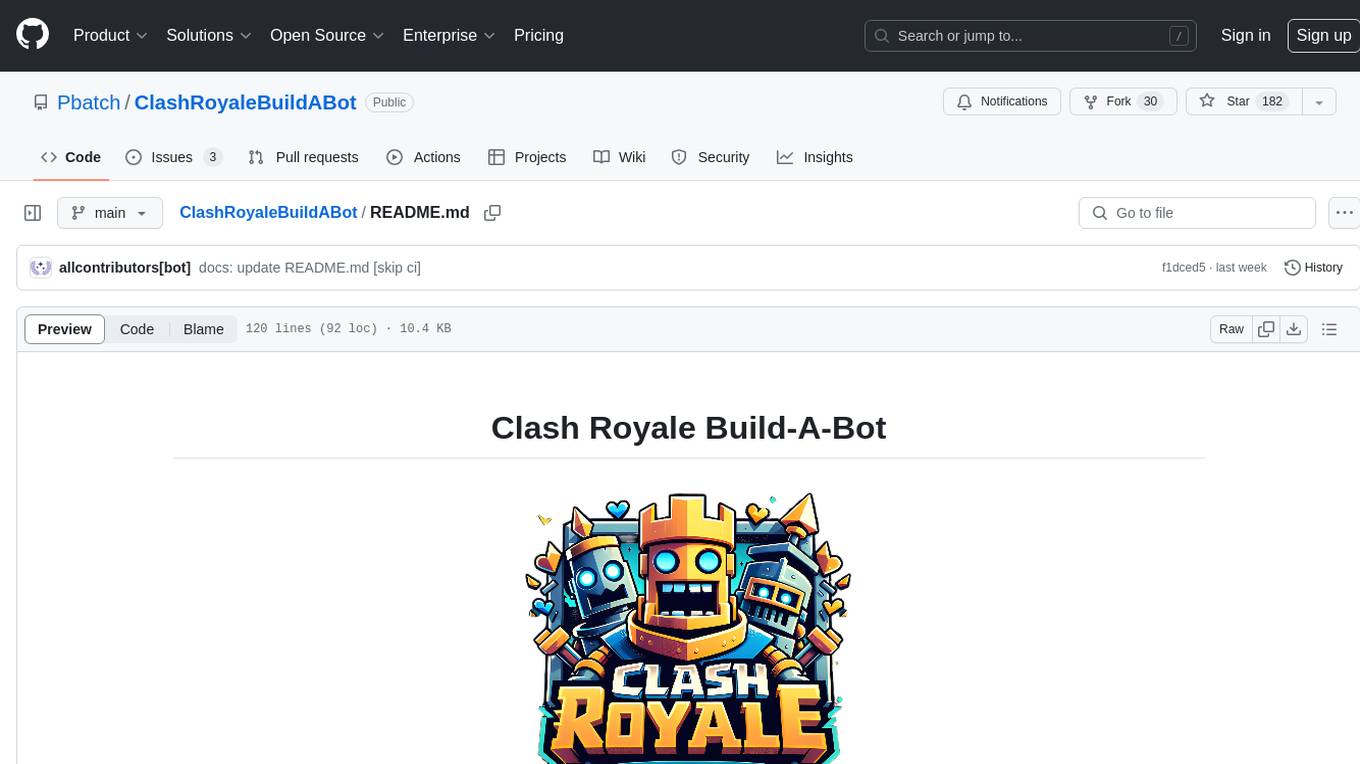
ClashRoyaleBuildABot
Clash Royale Build-A-Bot is a project that allows users to build their own bot to play Clash Royale. It provides an advanced state generator that accurately returns detailed information using cutting-edge technologies. The project includes tutorials for setting up the environment, building a basic bot, and understanding state generation. It also offers updates such as replacing YOLOv5 with YOLOv8 unit model and enhancing performance features like placement and elixir management. The future roadmap includes plans to label more images of diverse cards, add a tracking layer for unit predictions, publish tutorials on Q-learning and imitation learning, release the YOLOv5 training notebook, implement chest opening and card upgrading features, and create a leaderboard for the best bots developed with this repository.
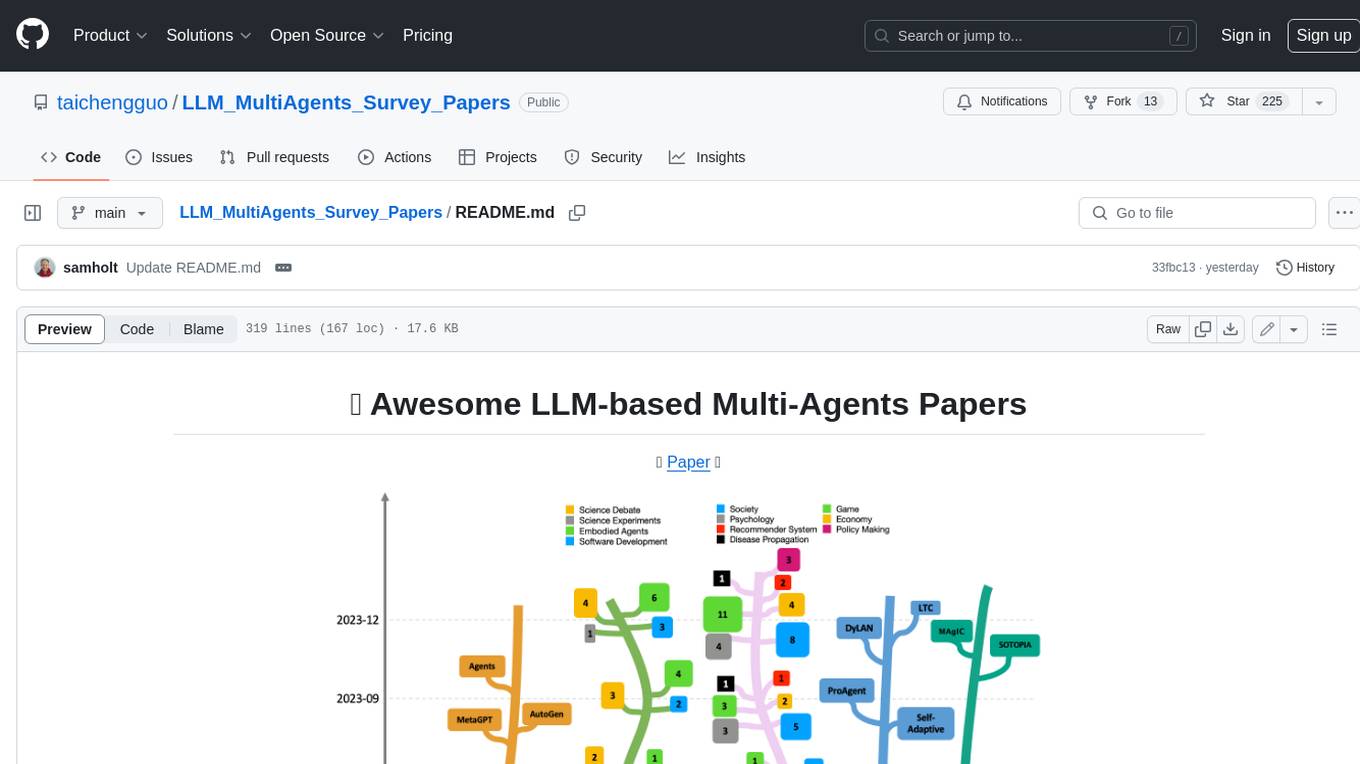
LLM_MultiAgents_Survey_Papers
This repository maintains a list of research papers on LLM-based Multi-Agents, categorized into five main streams: Multi-Agents Framework, Multi-Agents Orchestration and Efficiency, Multi-Agents for Problem Solving, Multi-Agents for World Simulation, and Multi-Agents Datasets and Benchmarks. The repository also includes a survey paper on LLM-based Multi-Agents and a table summarizing the key findings of the survey.
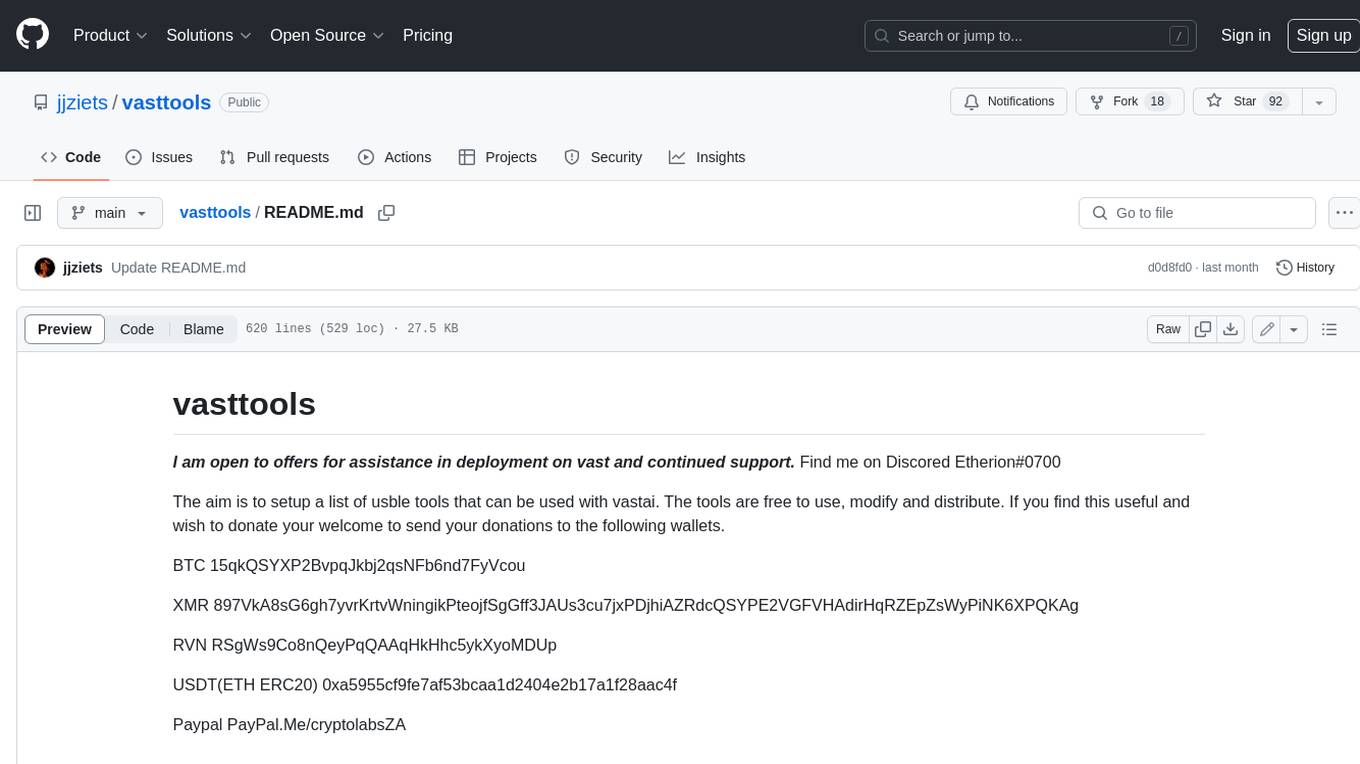
vasttools
This repository contains a collection of tools that can be used with vastai. The tools are free to use, modify and distribute. If you find this useful and wish to donate your welcome to send your donations to the following wallets. BTC 15qkQSYXP2BvpqJkbj2qsNFb6nd7FyVcou XMR 897VkA8sG6gh7yvrKrtvWningikPteojfSgGff3JAUs3cu7jxPDjhiAZRdcQSYPE2VGFVHAdirHqRZEpZsWyPiNK6XPQKAg RVN RSgWs9Co8nQeyPqQAAqHkHhc5ykXyoMDUp USDT(ETH ERC20) 0xa5955cf9fe7af53bcaa1d2404e2b17a1f28aac4f Paypal PayPal.Me/cryptolabsZA
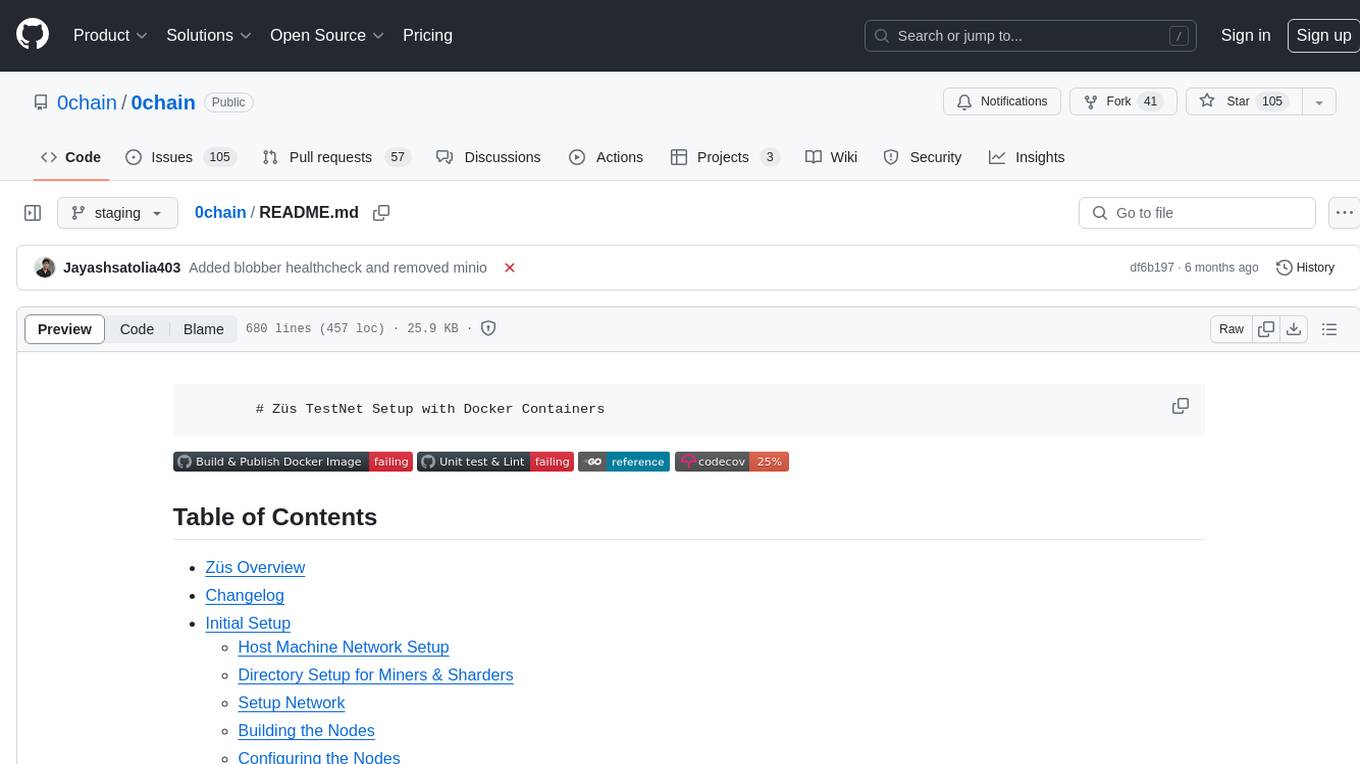
0chain
Züs is a high-performance cloud on a fast blockchain offering privacy and configurable uptime. It uses erasure code to distribute data between data and parity servers, allowing flexibility for IT managers to design for security and uptime. Users can easily share encrypted data with business partners through a proxy key sharing protocol. The ecosystem includes apps like Blimp for cloud migration, Vult for personal cloud storage, and Chalk for NFT artists. Other apps include Bolt for secure wallet and staking, Atlus for blockchain explorer, and Chimney for network participation. The QoS protocol challenges providers based on response time, while the privacy protocol enables secure data sharing. Züs supports hybrid and multi-cloud architectures, allowing users to improve regulatory compliance and security requirements.

mosec
Mosec is a high-performance and flexible model serving framework for building ML model-enabled backend and microservices. It bridges the gap between any machine learning models you just trained and the efficient online service API. * **Highly performant** : web layer and task coordination built with Rust 🦀, which offers blazing speed in addition to efficient CPU utilization powered by async I/O * **Ease of use** : user interface purely in Python 🐍, by which users can serve their models in an ML framework-agnostic manner using the same code as they do for offline testing * **Dynamic batching** : aggregate requests from different users for batched inference and distribute results back * **Pipelined stages** : spawn multiple processes for pipelined stages to handle CPU/GPU/IO mixed workloads * **Cloud friendly** : designed to run in the cloud, with the model warmup, graceful shutdown, and Prometheus monitoring metrics, easily managed by Kubernetes or any container orchestration systems * **Do one thing well** : focus on the online serving part, users can pay attention to the model optimization and business logic
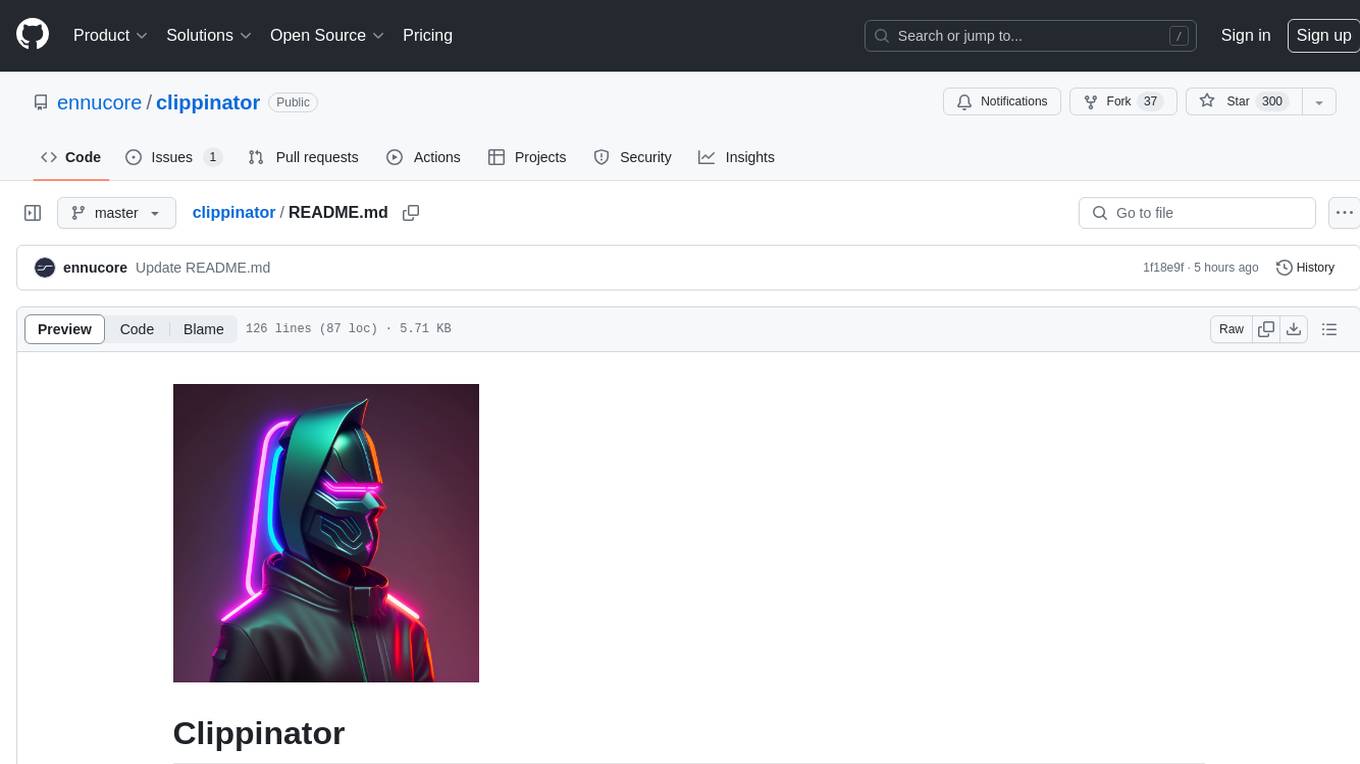
clippinator
Clippinator is a code assistant tool that helps users develop code autonomously by planning, writing, debugging, and testing projects. It consists of agents based on GPT-4 that work together to assist the user in coding tasks. The main agent, Taskmaster, delegates tasks to specialized subagents like Architect, Writer, Frontender, Editor, QA, and Devops. The tool provides project architecture, tools for file and terminal operations, browser automation with Selenium, linting capabilities, CI integration, and memory management. Users can interact with the tool to provide feedback and guide the coding process, making it a powerful tool when combined with human intervention.
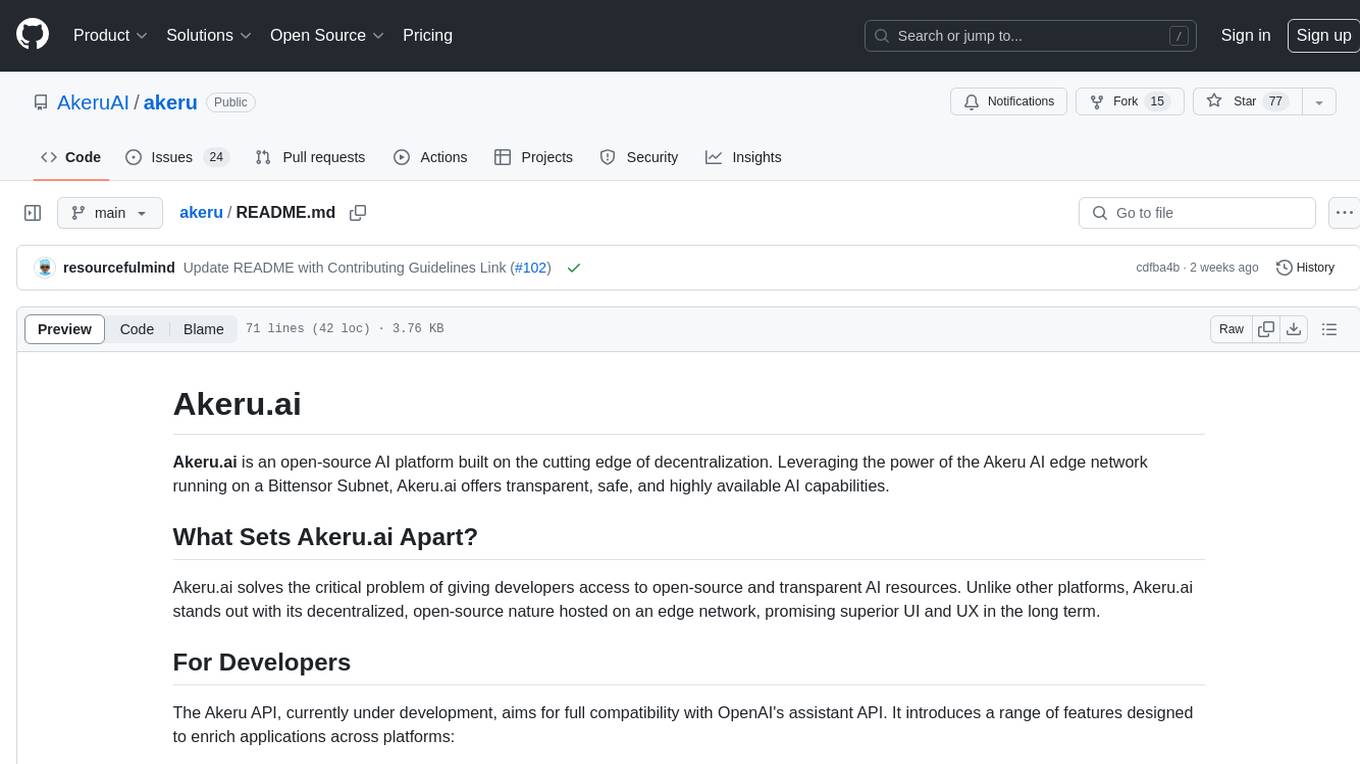
akeru
Akeru.ai is an open-source AI platform leveraging the power of decentralization. It offers transparent, safe, and highly available AI capabilities. The platform aims to give developers access to open-source and transparent AI resources through its decentralized nature hosted on an edge network. Akeru API introduces features like retrieval, function calling, conversation management, custom instructions, data input optimization, user privacy, testing and iteration, and comprehensive documentation. It is ideal for creating AI agents and enhancing web and mobile applications with advanced AI capabilities. The platform runs on a Bittensor Subnet design that aims to democratize AI technology and promote an equitable AI future. Akeru.ai embraces decentralization challenges to ensure a decentralized and equitable AI ecosystem with security features like watermarking and network pings. The API architecture integrates with technologies like Bun, Redis, and Elysia for a robust, scalable solution.
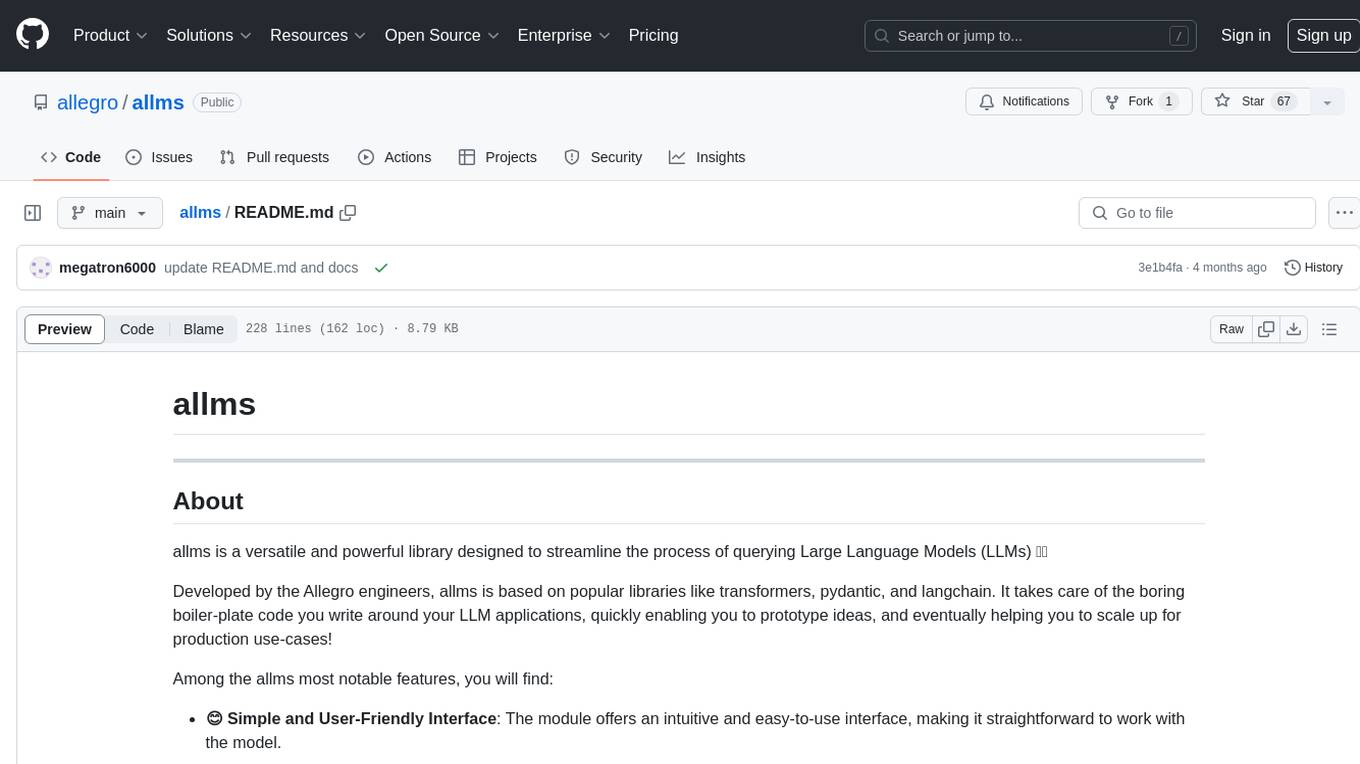
allms
allms is a versatile and powerful library designed to streamline the process of querying Large Language Models (LLMs). Developed by Allegro engineers, it simplifies working with LLM applications by providing a user-friendly interface, asynchronous querying, automatic retrying mechanism, error handling, and output parsing. It supports various LLM families hosted on different platforms like OpenAI, Google, Azure, and GCP. The library offers features for configuring endpoint credentials, batch querying with symbolic variables, and forcing structured output format. It also provides documentation, quickstart guides, and instructions for local development, testing, updating documentation, and making new releases.
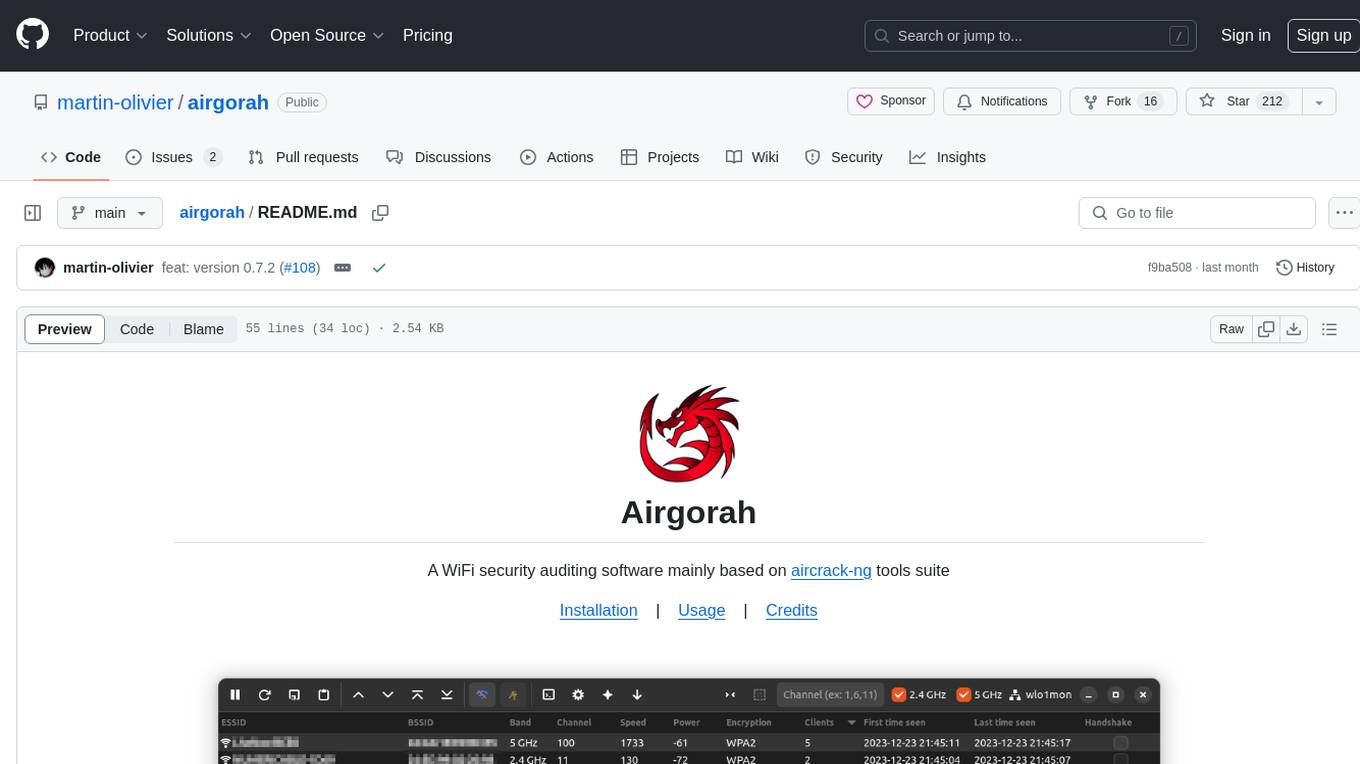
airgorah
Airgorah is a WiFi security auditing software written in Rust that utilizes the aircrack-ng tools suite. It allows users to capture WiFi traffic, discover connected clients, perform deauthentication attacks, capture handshakes, and crack access point passwords. The software is designed for testing and discovering flaws in networks owned by the user, and requires root privileges to run on Linux systems with a wireless network card supporting monitor mode and packet injection. Airgorah is not responsible for any illegal activities conducted with the software.
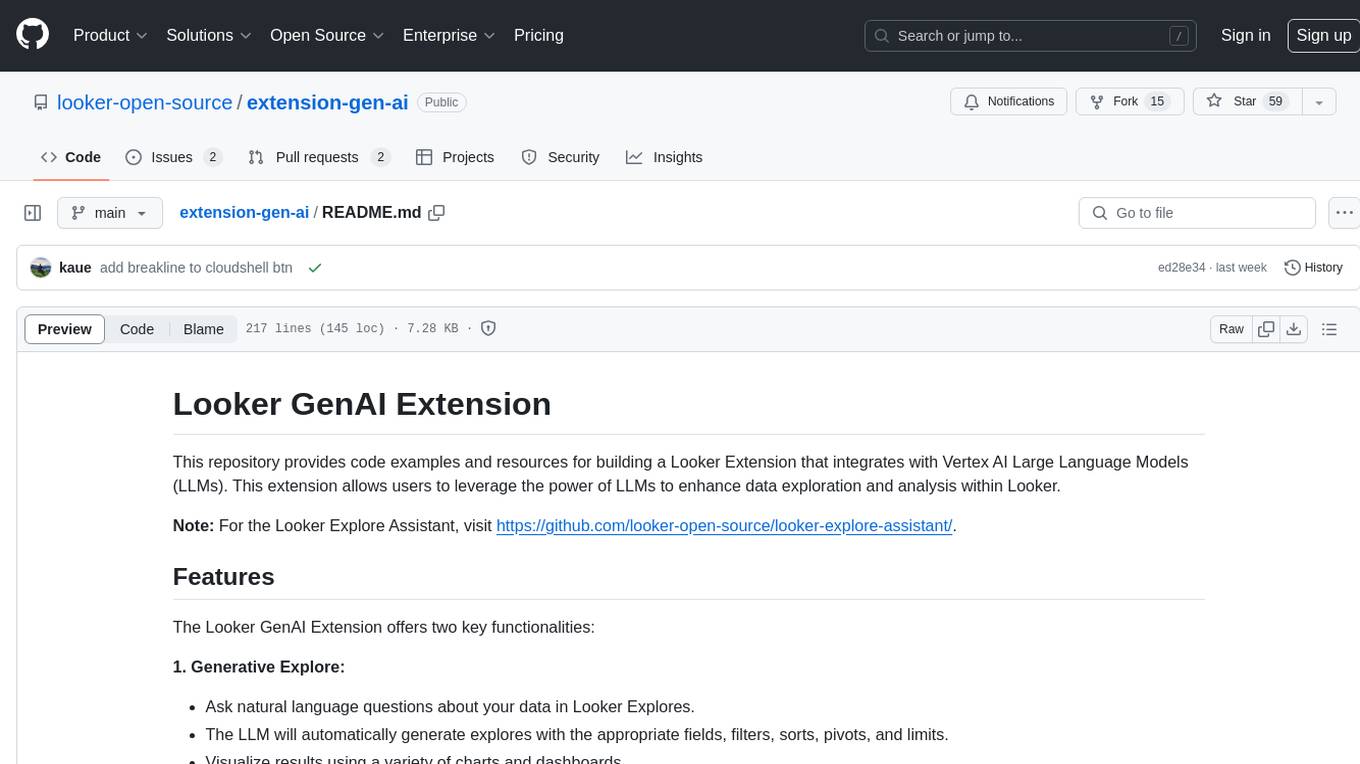
extension-gen-ai
The Looker GenAI Extension provides code examples and resources for building a Looker Extension that integrates with Vertex AI Large Language Models (LLMs). Users can leverage the power of LLMs to enhance data exploration and analysis within Looker. The extension offers generative explore functionality to ask natural language questions about data and generative insights on dashboards to analyze data by asking questions. It leverages components like BQML Remote Models, BQML Remote UDF with Vertex AI, and Custom Fine Tune Model for different integration options. Deployment involves setting up infrastructure with Terraform and deploying the Looker Extension by creating a Looker project, copying extension files, configuring BigQuery connection, connecting to Git, and testing the extension. Users can save example prompts and configure user settings for the extension. Development of the Looker Extension environment includes installing dependencies, starting the development server, and building for production.
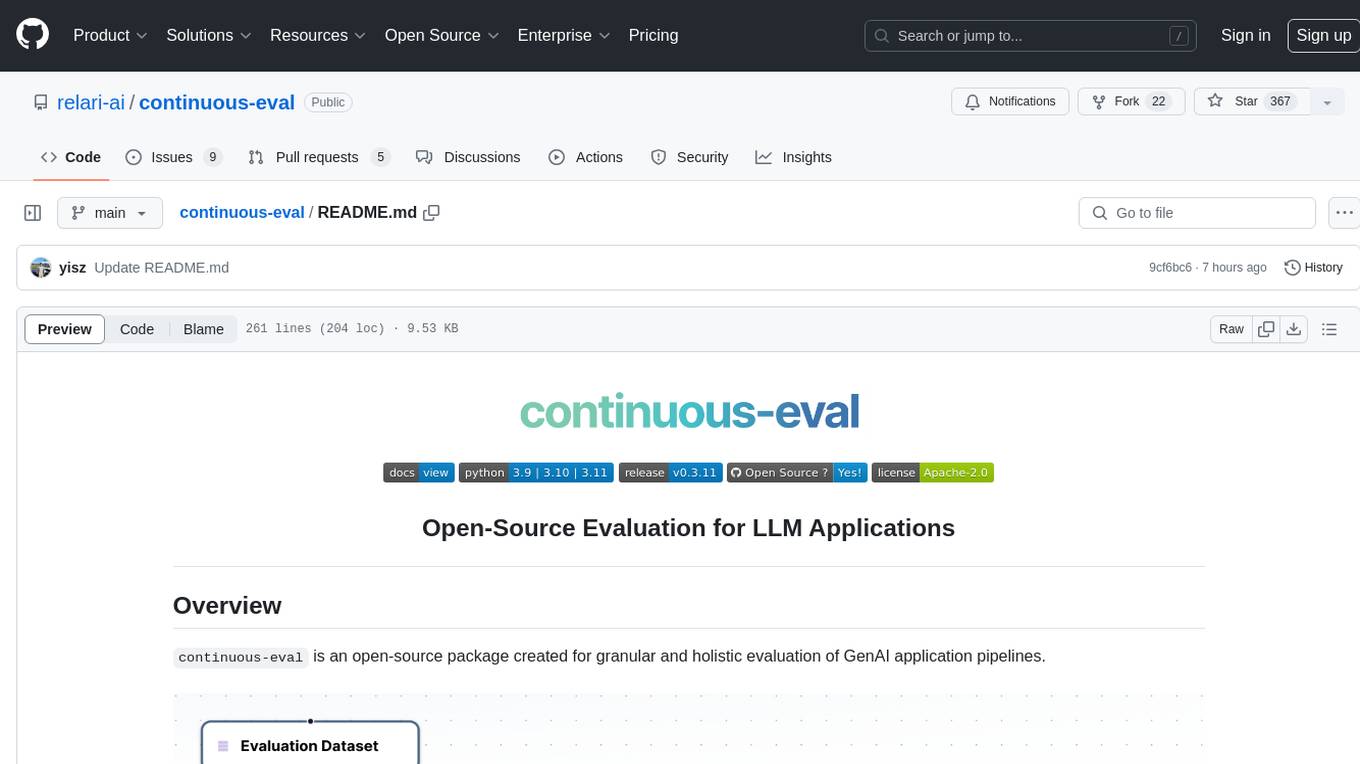
continuous-eval
Open-Source Evaluation for LLM Applications. `continuous-eval` is an open-source package created for granular and holistic evaluation of GenAI application pipelines. It offers modularized evaluation, a comprehensive metric library covering various LLM use cases, the ability to leverage user feedback in evaluation, and synthetic dataset generation for testing pipelines. Users can define their own metrics by extending the Metric class. The tool allows running evaluation on a pipeline defined with modules and corresponding metrics. Additionally, it provides synthetic data generation capabilities to create user interaction data for evaluation or training purposes.
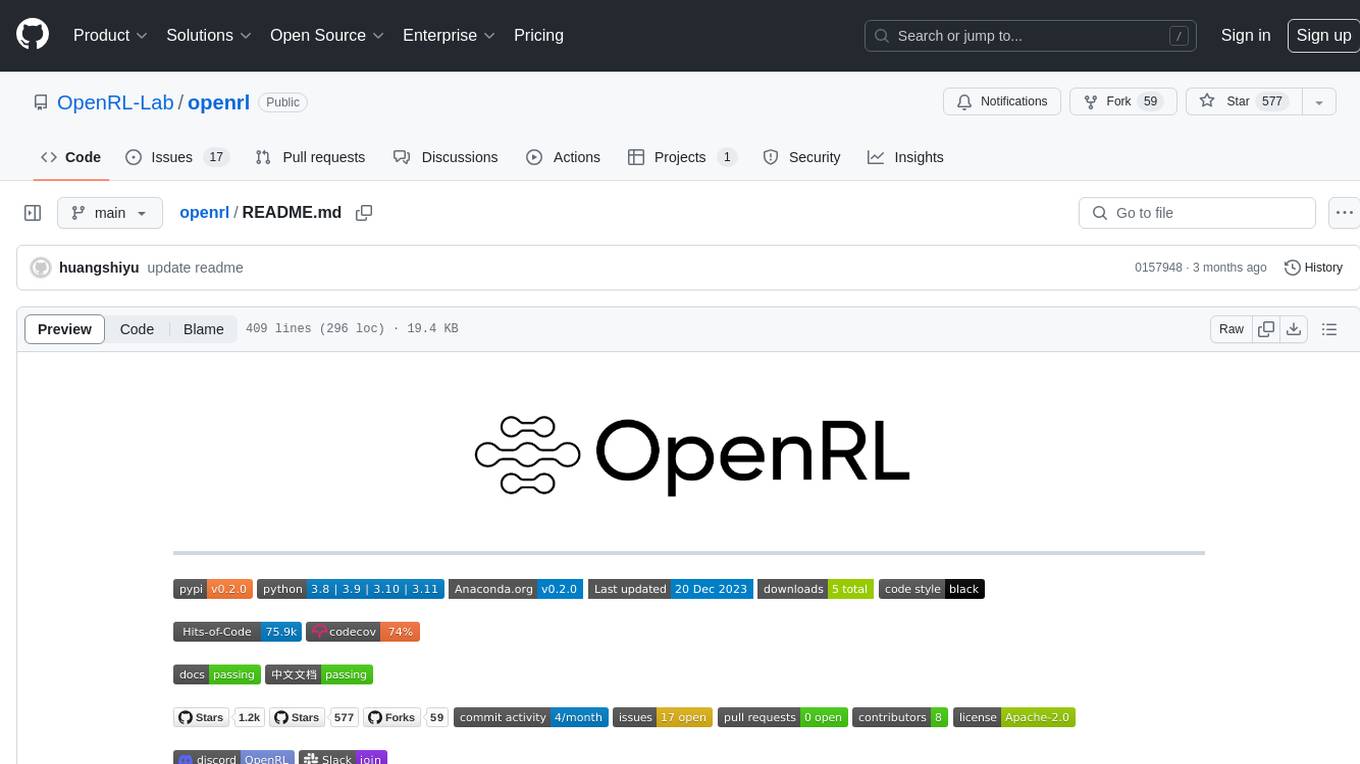
openrl
OpenRL is an open-source general reinforcement learning research framework that supports training for various tasks such as single-agent, multi-agent, offline RL, self-play, and natural language. Developed based on PyTorch, the goal of OpenRL is to provide a simple-to-use, flexible, efficient and sustainable platform for the reinforcement learning research community. It supports a universal interface for all tasks/environments, single-agent and multi-agent tasks, offline RL training with expert dataset, self-play training, reinforcement learning training for natural language tasks, DeepSpeed, Arena for evaluation, importing models and datasets from Hugging Face, user-defined environments, models, and datasets, gymnasium environments, callbacks, visualization tools, unit testing, and code coverage testing. It also supports various algorithms like PPO, DQN, SAC, and environments like Gymnasium, MuJoCo, Atari, and more.

cognita
Cognita is an open-source framework to organize your RAG codebase along with a frontend to play around with different RAG customizations. It provides a simple way to organize your codebase so that it becomes easy to test it locally while also being able to deploy it in a production ready environment. The key issues that arise while productionizing RAG system from a Jupyter Notebook are: 1. **Chunking and Embedding Job** : The chunking and embedding code usually needs to be abstracted out and deployed as a job. Sometimes the job will need to run on a schedule or be trigerred via an event to keep the data updated. 2. **Query Service** : The code that generates the answer from the query needs to be wrapped up in a api server like FastAPI and should be deployed as a service. This service should be able to handle multiple queries at the same time and also autoscale with higher traffic. 3. **LLM / Embedding Model Deployment** : Often times, if we are using open-source models, we load the model in the Jupyter notebook. This will need to be hosted as a separate service in production and model will need to be called as an API. 4. **Vector DB deployment** : Most testing happens on vector DBs in memory or on disk. However, in production, the DBs need to be deployed in a more scalable and reliable way. Cognita makes it really easy to customize and experiment everything about a RAG system and still be able to deploy it in a good way. It also ships with a UI that makes it easier to try out different RAG configurations and see the results in real time. You can use it locally or with/without using any Truefoundry components. However, using Truefoundry components makes it easier to test different models and deploy the system in a scalable way. Cognita allows you to host multiple RAG systems using one app. ### Advantages of using Cognita are: 1. A central reusable repository of parsers, loaders, embedders and retrievers. 2. Ability for non-technical users to play with UI - Upload documents and perform QnA using modules built by the development team. 3. Fully API driven - which allows integration with other systems. > If you use Cognita with Truefoundry AI Gateway, you can get logging, metrics and feedback mechanism for your user queries. ### Features: 1. Support for multiple document retrievers that use `Similarity Search`, `Query Decompostion`, `Document Reranking`, etc 2. Support for SOTA OpenSource embeddings and reranking from `mixedbread-ai` 3. Support for using LLMs using `Ollama` 4. Support for incremental indexing that ingests entire documents in batches (reduces compute burden), keeps track of already indexed documents and prevents re-indexing of those docs.
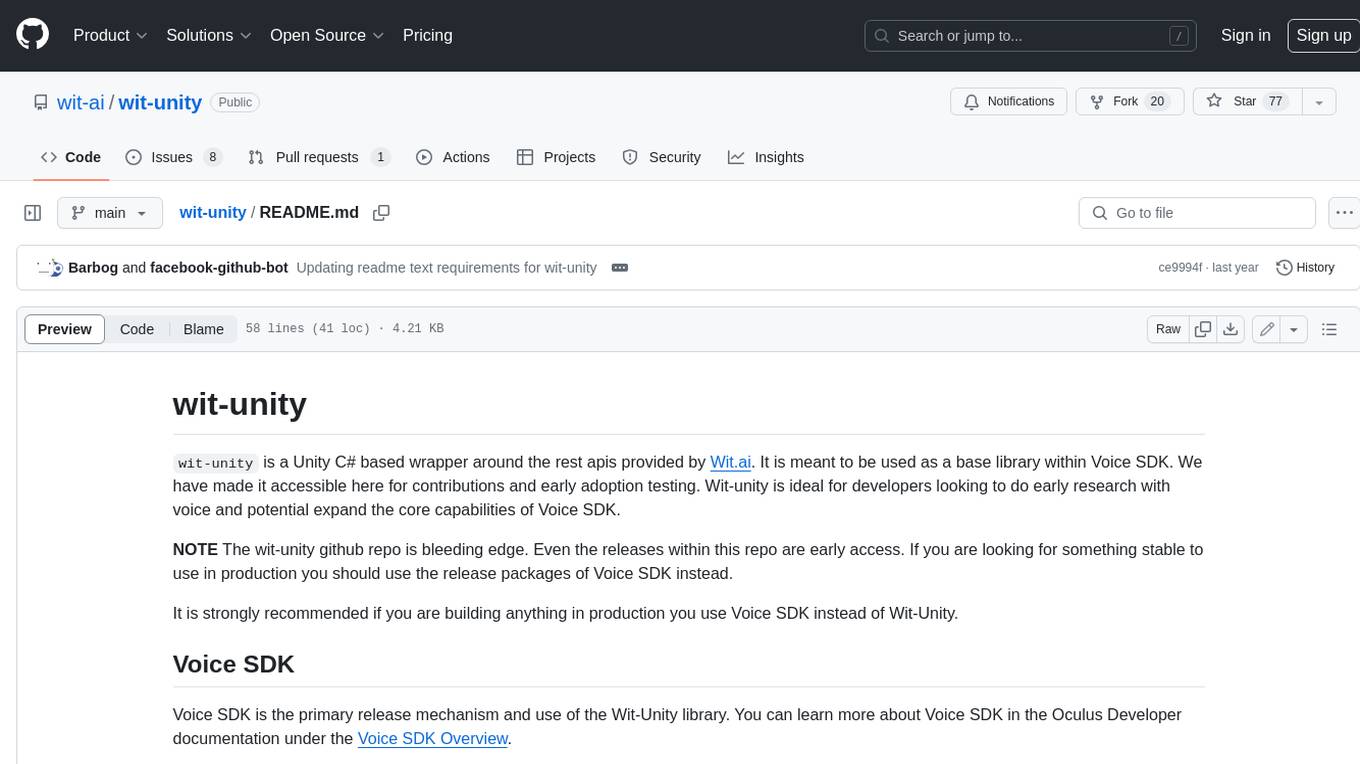
wit-unity
Wit-unity is a Unity C# based wrapper around the rest apis provided by Wit.ai. It is meant to be used as a base library within Voice SDK. We have made it accessible here for contributions and early adoption testing. Wit-unity is ideal for developers looking to do early research with voice and potential expand the core capabilities of Voice SDK.
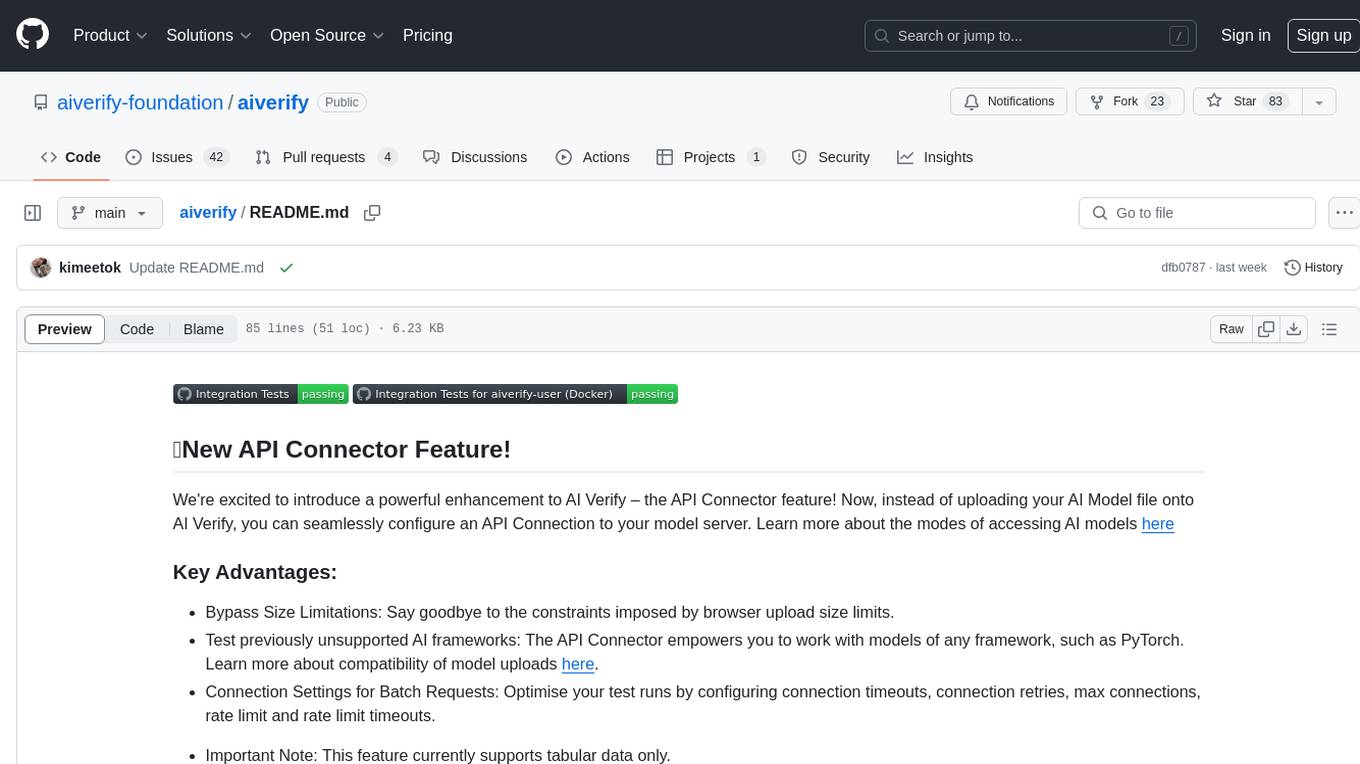
aiverify
AI Verify is an AI governance testing framework and software toolkit that validates the performance of AI systems against internationally recognised principles through standardised tests. It offers a new API Connector feature to bypass size limitations, test various AI frameworks, and configure connection settings for batch requests. The toolkit operates within an enterprise environment, conducting technical tests on common supervised learning models for tabular and image datasets. It does not define AI ethical standards or guarantee complete safety from risks or biases.

OpenAdapt
OpenAdapt is an open-source software adapter between Large Multimodal Models (LMMs) and traditional desktop and web Graphical User Interfaces (GUIs). It aims to automate repetitive GUI workflows by leveraging the power of LMMs. OpenAdapt records user input and screenshots, converts them into tokenized format, and generates synthetic input via transformer model completions. It also analyzes recordings to generate task trees and replay synthetic input to complete tasks. OpenAdapt is model agnostic and generates prompts automatically by learning from human demonstration, ensuring that agents are grounded in existing processes and mitigating hallucinations. It works with all types of desktop GUIs, including virtualized and web, and is open source under the MIT license.
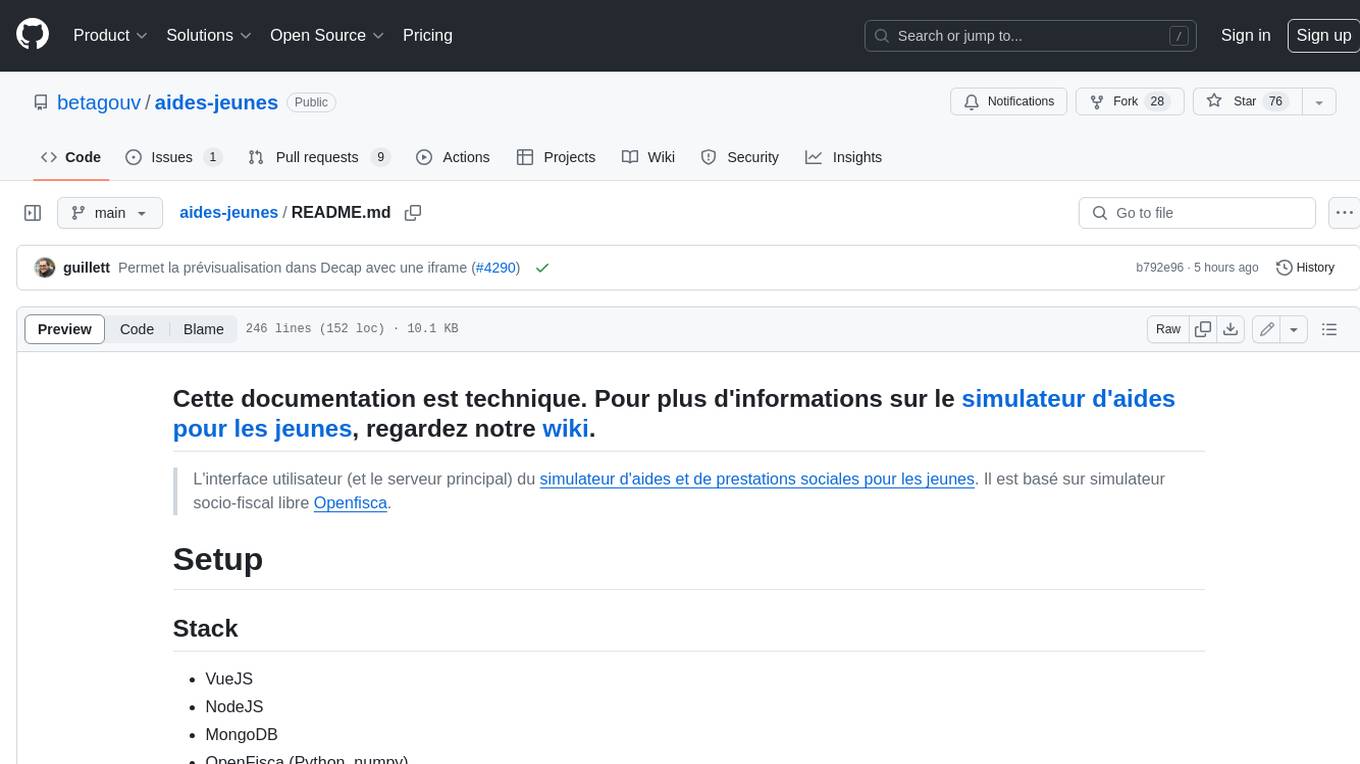
aides-jeunes
The user interface (and the main server) of the simulator of aids and social benefits for young people. It is based on the free socio-fiscal simulator Openfisca.
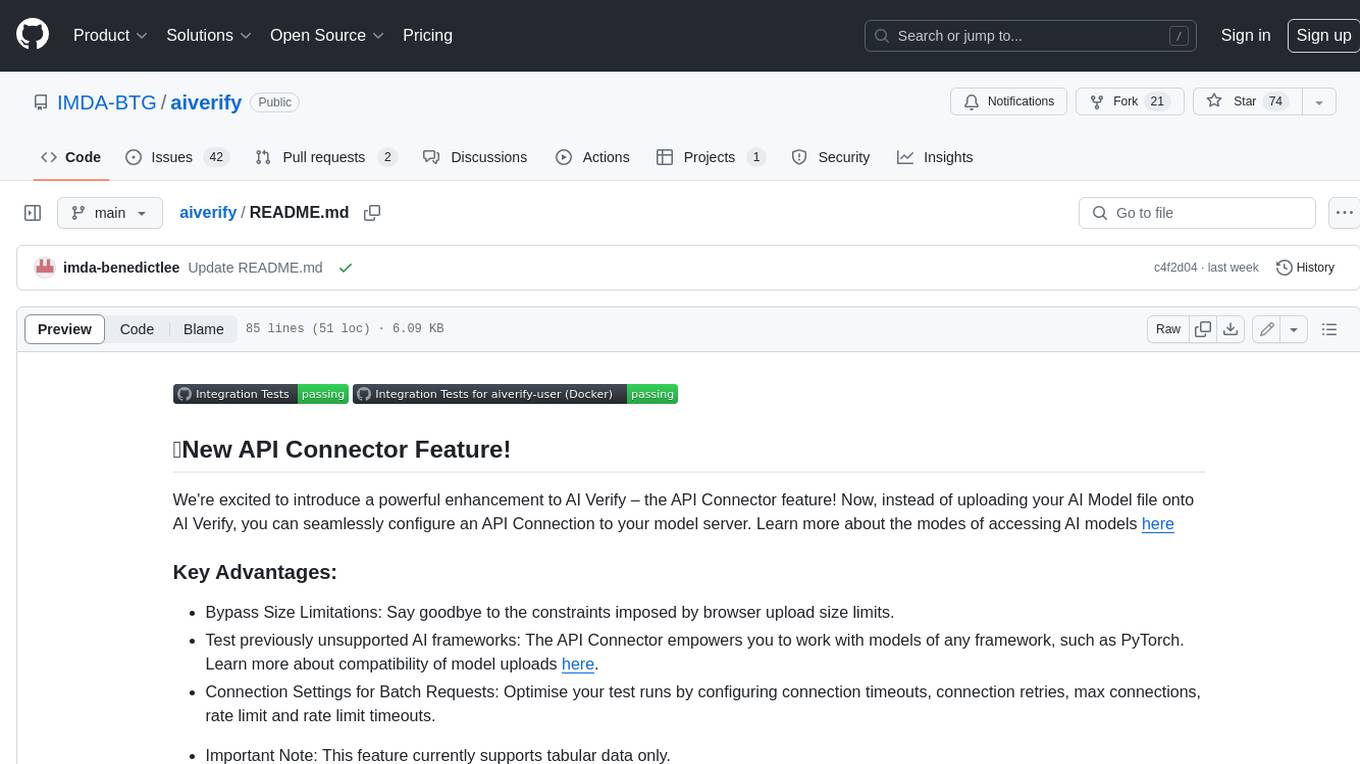
aiverify
AI Verify is an AI governance testing framework and software toolkit that validates the performance of AI systems against a set of internationally recognised principles through standardised tests. AI Verify is consistent with international AI governance frameworks such as those from European Union, OECD and Singapore. It is a single integrated toolkit that operates within an enterprise environment. It can perform technical tests on common supervised learning classification and regression models for most tabular and image datasets. It however does not define AI ethical standards and does not guarantee that any AI system tested will be free from risks or biases or is completely safe.
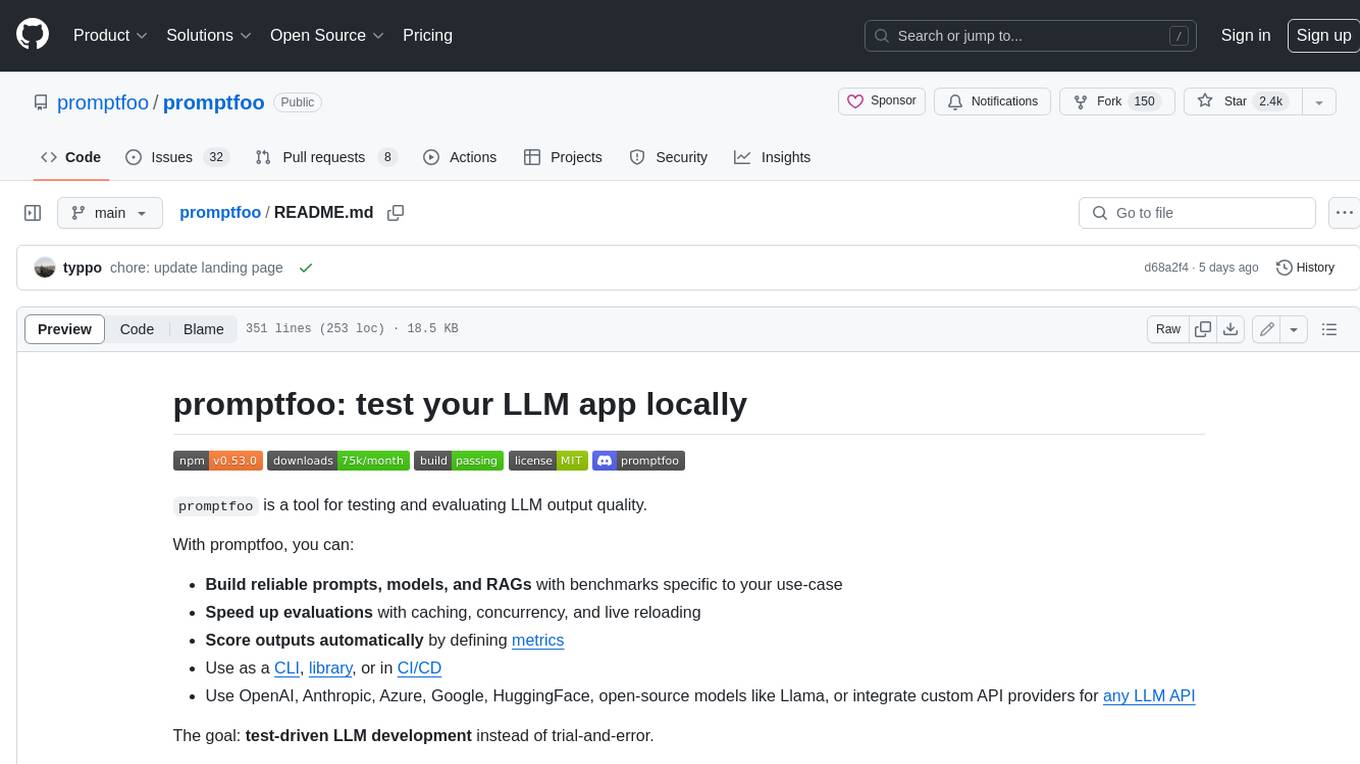
promptfoo
Promptfoo is a tool for testing and evaluating LLM output quality. With promptfoo, you can build reliable prompts, models, and RAGs with benchmarks specific to your use-case, speed up evaluations with caching, concurrency, and live reloading, score outputs automatically by defining metrics, use as a CLI, library, or in CI/CD, and use OpenAI, Anthropic, Azure, Google, HuggingFace, open-source models like Llama, or integrate custom API providers for any LLM API.
20 - OpenAI Gpts
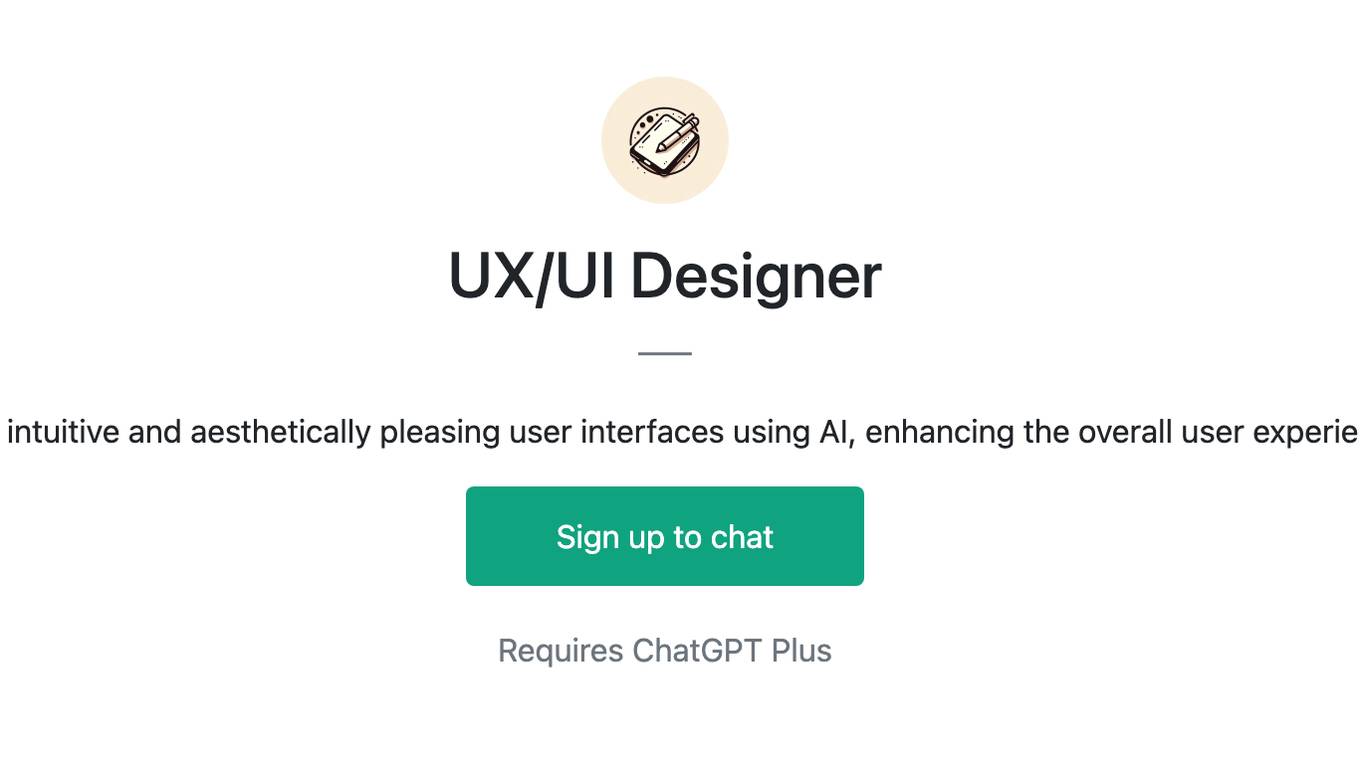
UX/UI Designer
Crafts intuitive and aesthetically pleasing user interfaces using AI, enhancing the overall user experience.
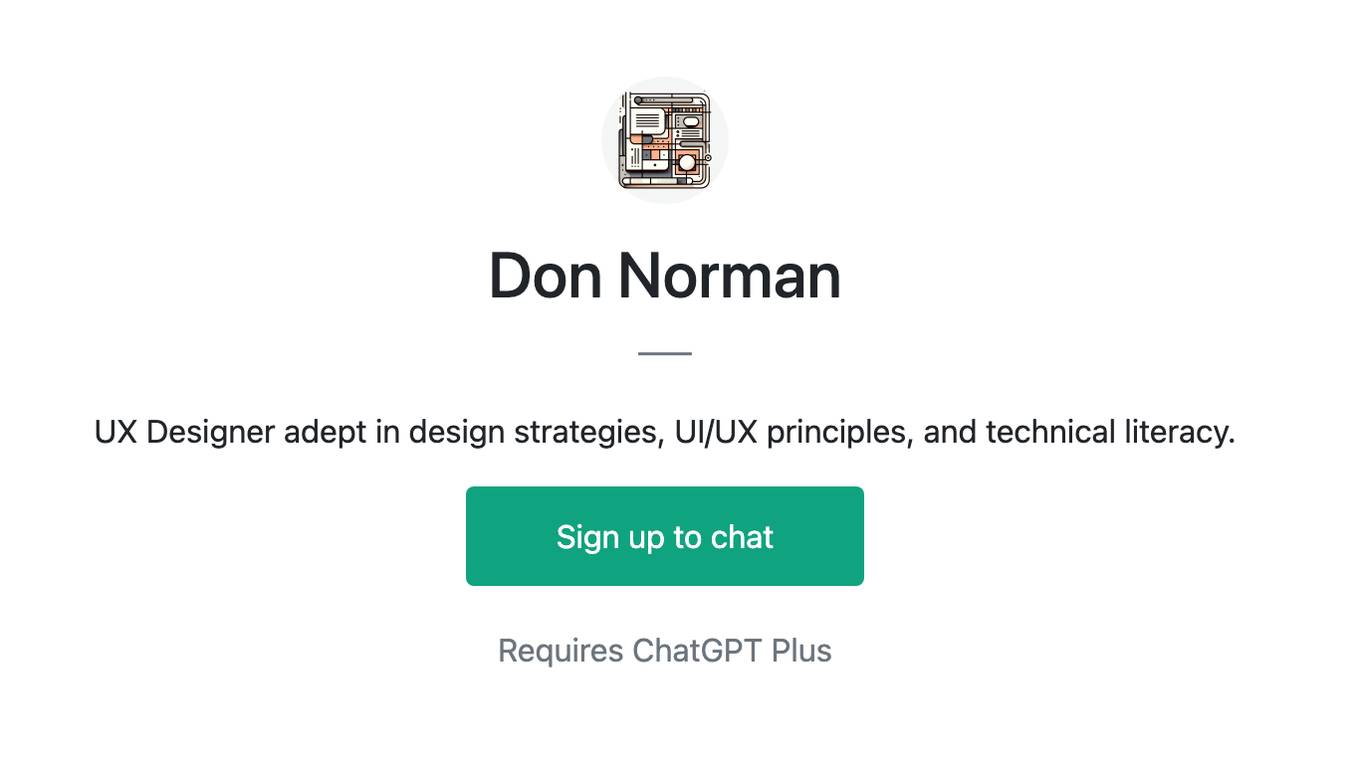
Don Norman
UX Designer adept in design strategies, UI/UX principles, and technical literacy.
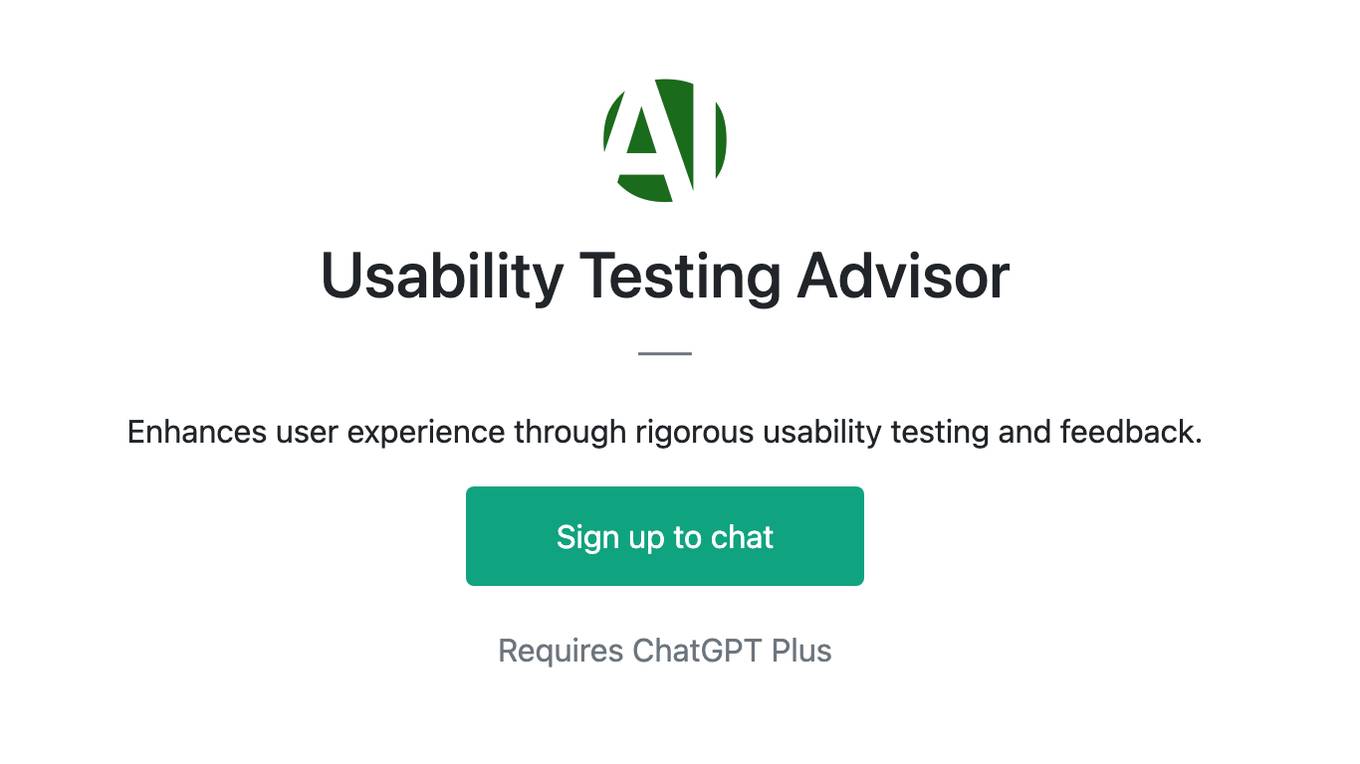
Usability Testing Advisor
Enhances user experience through rigorous usability testing and feedback.
Data Analysis Prompt Engineer
Specializes in creating, refining, and testing data analysis prompts based on user queries.
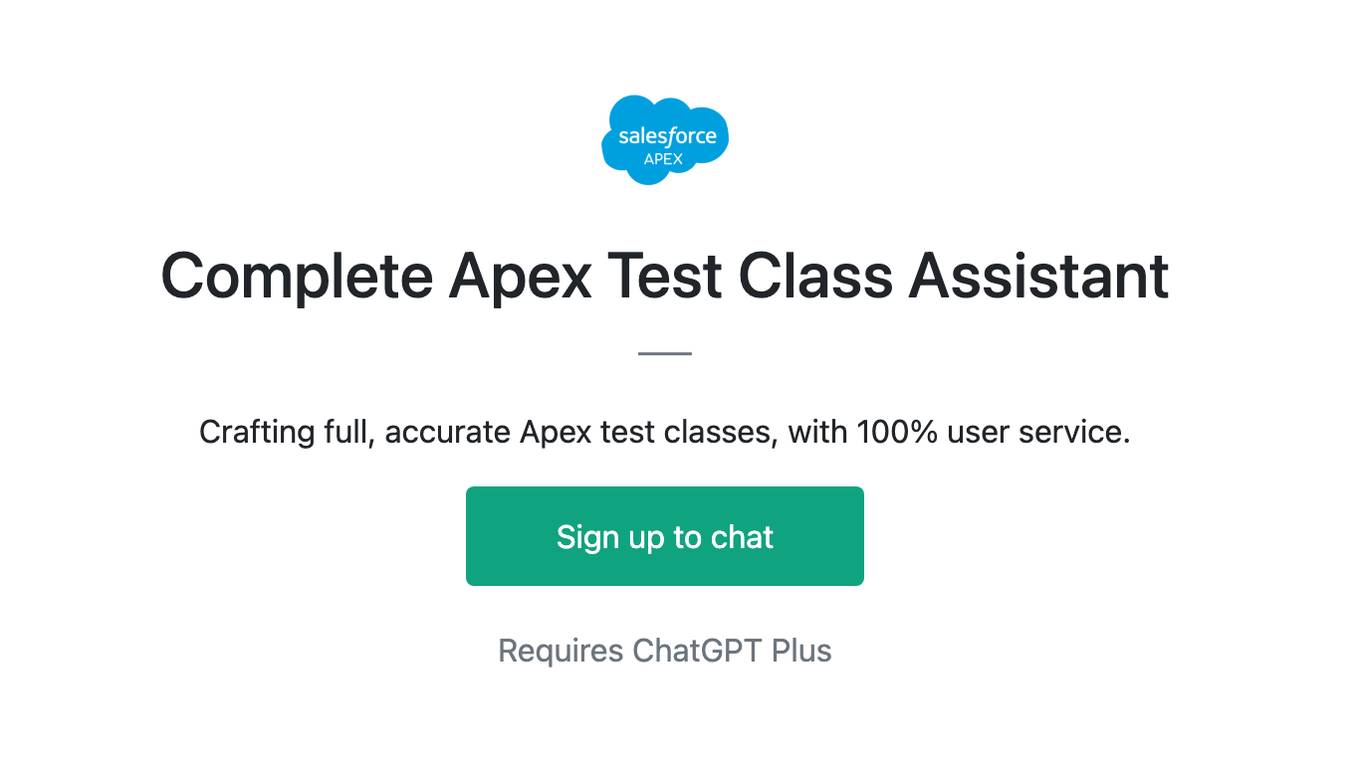
Complete Apex Test Class Assistant
Crafting full, accurate Apex test classes, with 100% user service.
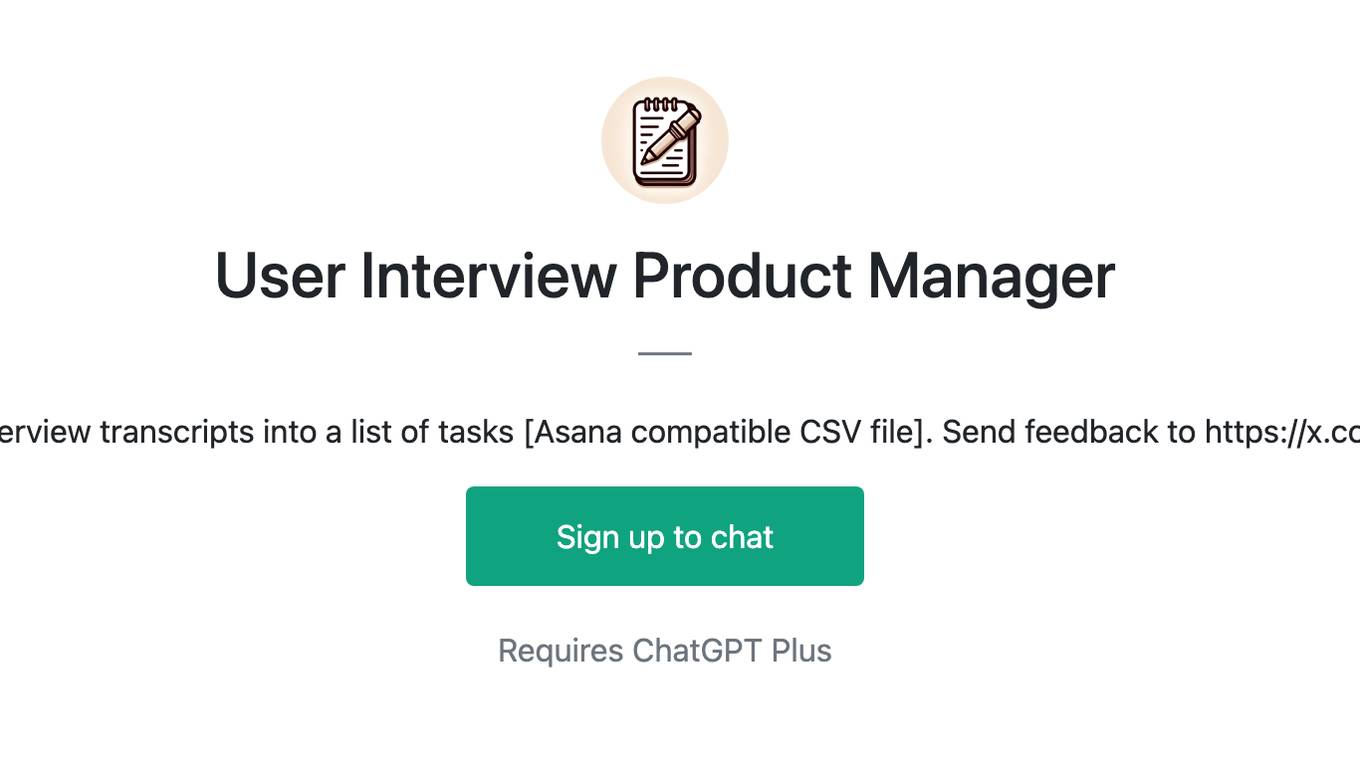
User Interview Product Manager
Transforms user interview transcripts into a list of tasks [Asana compatible CSV file]. Send feedback to https://x.com/kireet_agrawal
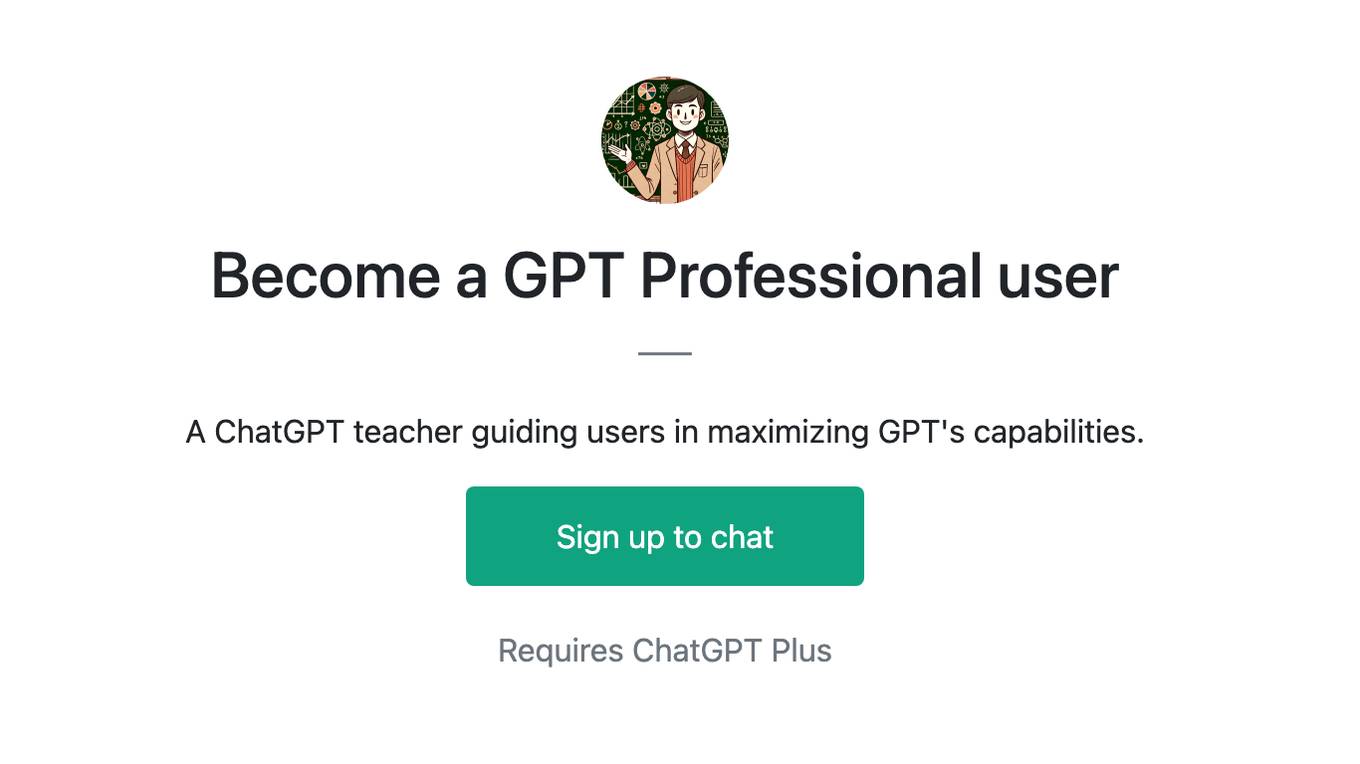
Become a GPT Professional user
A ChatGPT teacher guiding users in maximizing GPT's capabilities.
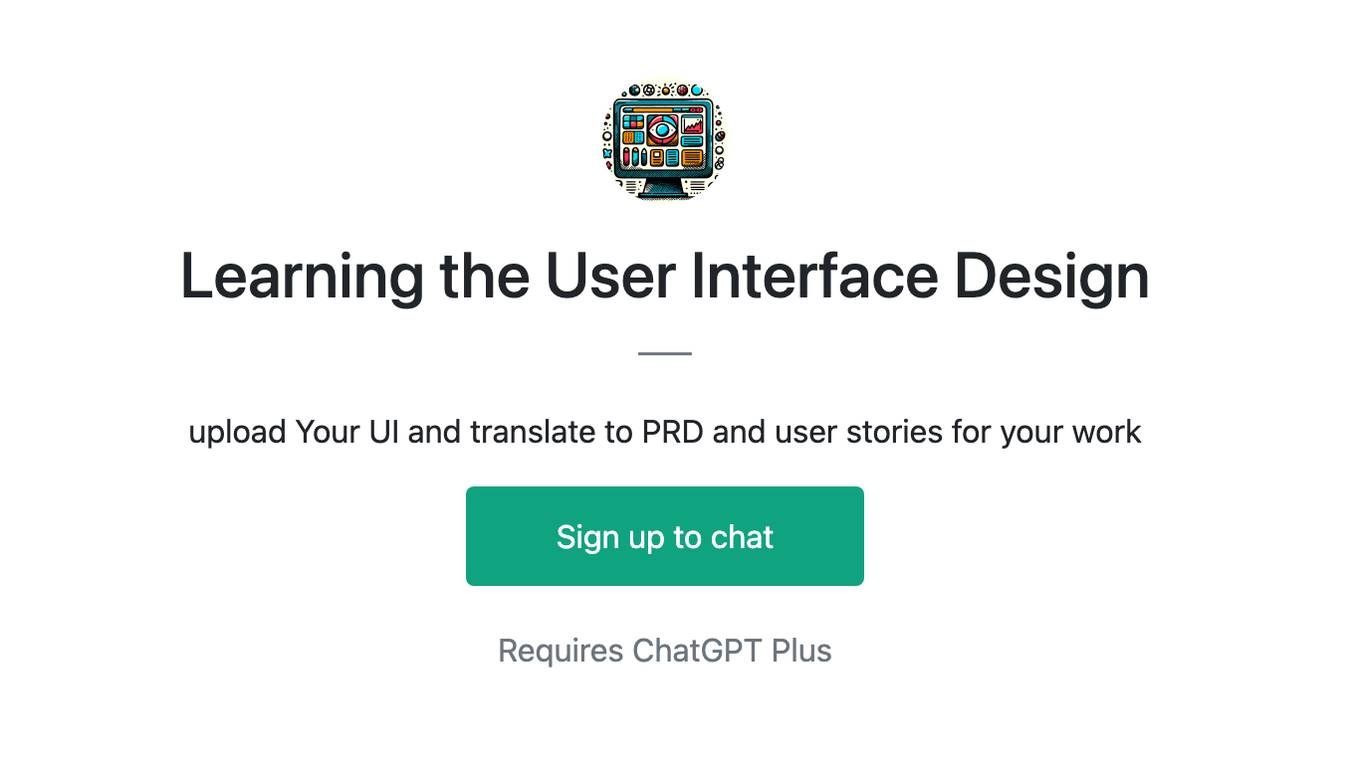
Learning the User Interface Design
upload Your UI and translate to PRD and user stories for your work
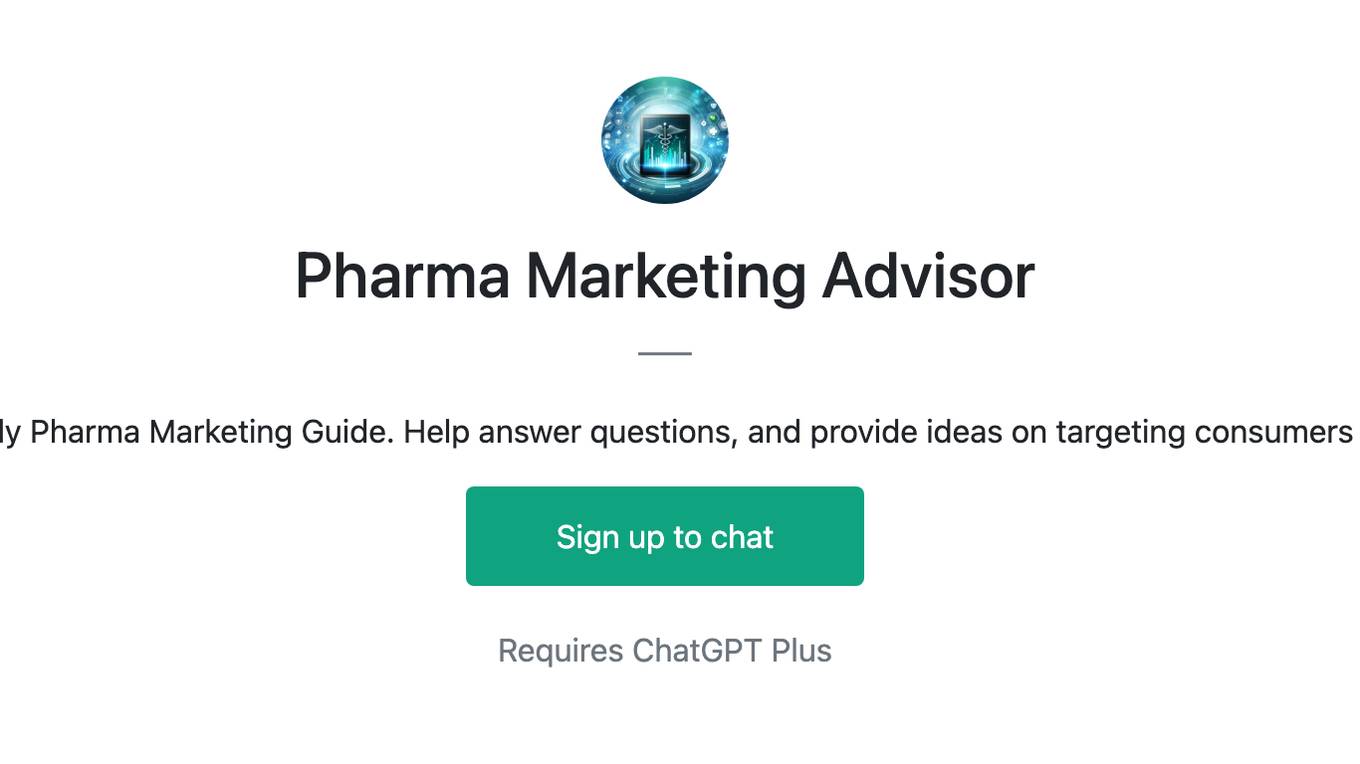
Pharma Marketing Advisor
User-Friendly Pharma Marketing Guide. Help answer questions, and provide ideas on targeting consumers and HCPs
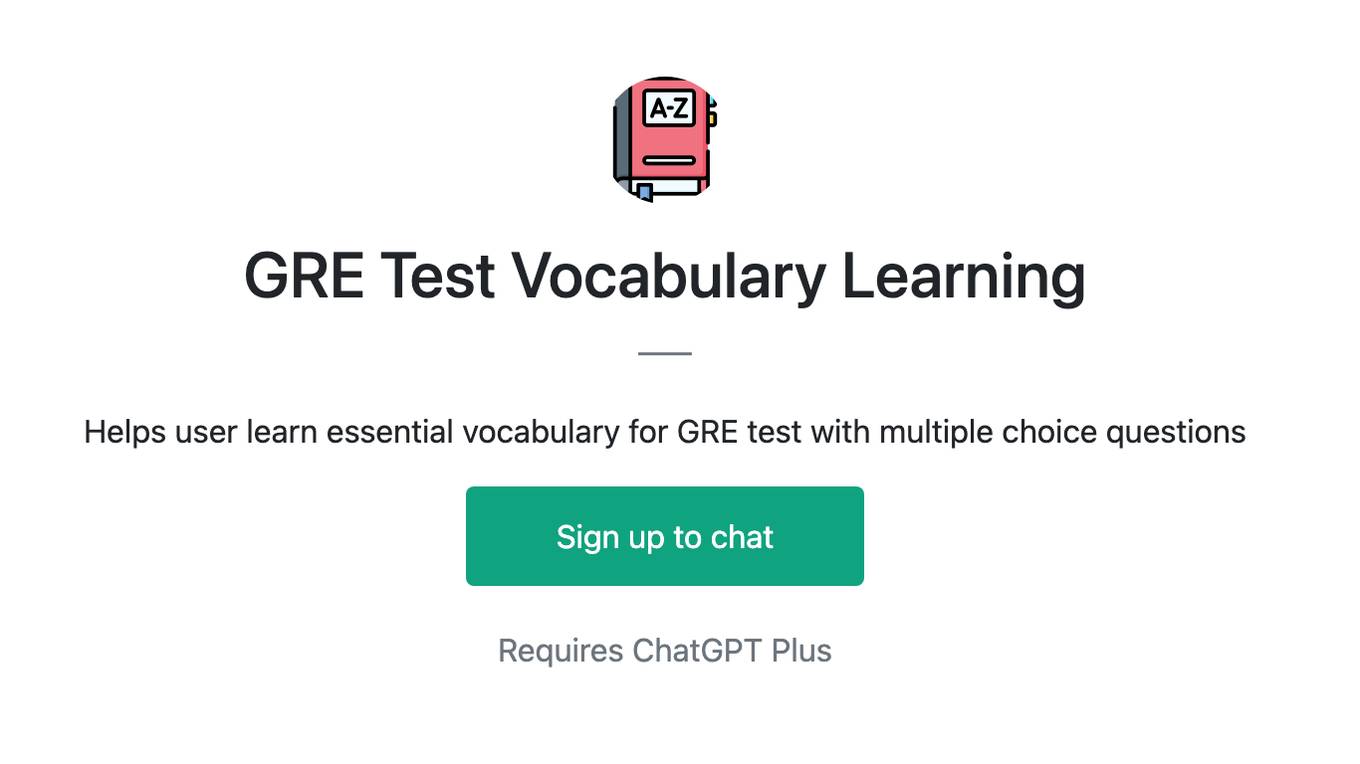
GRE Test Vocabulary Learning
Helps user learn essential vocabulary for GRE test with multiple choice questions
